Sample emails to your thesis supervisor
A good thesis requires good communication between you and your thesis supervisor. This includes emails! Yet, even a simple email can lead to stress and overthinking. If you struggle to communicate with your thesis supervisor via email, have a look at six sample emails for inspiration.
Disclaimer: This post may contain affiliate links, which means I may earn a small commission if you make a purchase using the links below at no additional cost to you. I only recommend products or services that I truly believe can benefit my audience. As always, my opinions are my own.

General tips for emailing your thesis supervisor
Sample email to thesis supervisor inquiring about potential supervision, sample email to thesis supervisor setting up a meeting, sample email to thesis supervisor sharing post-meeting action points, sample email to thesis supervisor asking for feedback, sample email to thesis supervisor asking for support, sample email to thesis supervisor when not meeting a deadline.
Every relationship between student and thesis supervisor is unique. And everyone has a unique (email) writing style.
Nonetheless, there are a few general tips for emailing your thesis supervisor:
- Properly address your supervisor. In some contexts, it is acceptable that students address their supervisors on a first-name basis. In others, it would be completely unthinkable! So make sure to follow context-specific standards, and learn how to address your supervisor depending on their position and rank in the university hierarchy . When in doubt, always go for the more formal option (Dr. x, Professor x, Prof. Dr. x, Mr. x, Ms. x).
- Keep your emails short. No one wants to read an email of the length of a novel. Too much text can bury your main request. Always state clearly what you want. Don’t expect your thesis supervisor to read between the lines.
- Create accompanying calendar invites to your emails. Once you and your thesis supervisor/s agree on a meeting date via email, make sure that you send everyone involved a calendar invite via email. It will be greatly appreciated.
- Don’t overthink your emails too much. You may obsess about formulating a certain sentence or making sure no word is missing and no grammatical mistake is made. While emails to your supervisor should not read like a jotted-down text message, overthinking your emails is also a waste of time. Your supervisor will not judge you if your email includes one whacky sentence or a single spelling mistake.
The first email to a potential thesis supervisor tends to be very formal. If you have never met the potential thesis supervisor in person before, make sure to check out tips on how to cold-email professors. In the following sample email, however, we assume that the student and the potential thesis supervisor met before.

Successful (postgraduate) students are proactive and take matters into their own hands. Reaching out to their thesis supervisors to set up a meeting is one part of it. The following sample email contains a simple request from a student to meet with her thesis supervisor.
To get the most out of thesis supervision meetings , it is highly recommended that the student takes notes during the meeting. Based on these notes, the student then summarises the key takeaways from the meeting, or action points, so to speak. These action points will guide the student’s work until the next meeting, and provide a written record of agreements.
Sometimes, it does not make sense to wait for feedback until the next supervision meeting. Of course, students should not bombard their supervisors with constant questions via email. However, a kind request once in a while is usually accepted and appreciated. The following sample email showcases a student asking for feedback.
As a student, it can also happen that you get stuck. Often, it is better to reach out and ask your thesis supervisor for support, both in terms of content or any other challenges you experience. Don’t suffer in silence. The following sample email shows an example of a student asking for support.
And lastly, there are the unfortunate occasions where you made agreements with your thesis supervisor, which you cannot meet. Pulling an all-nighter is generally a bad idea, as sleep is crucial for efficient thesis writing . It might be smarter, to be honest, and open about it and to inform your thesis advisor in advance. In the following sample email, the student informs the supervisor that he cannot meet the agreed deadline.
Get new content delivered directly to your inbox!
Subscribe and receive Master Academia's quarterly newsletter.
Asking for a recommendation letter from a PhD supervisor
How many conferences postgrads should attend, related articles.
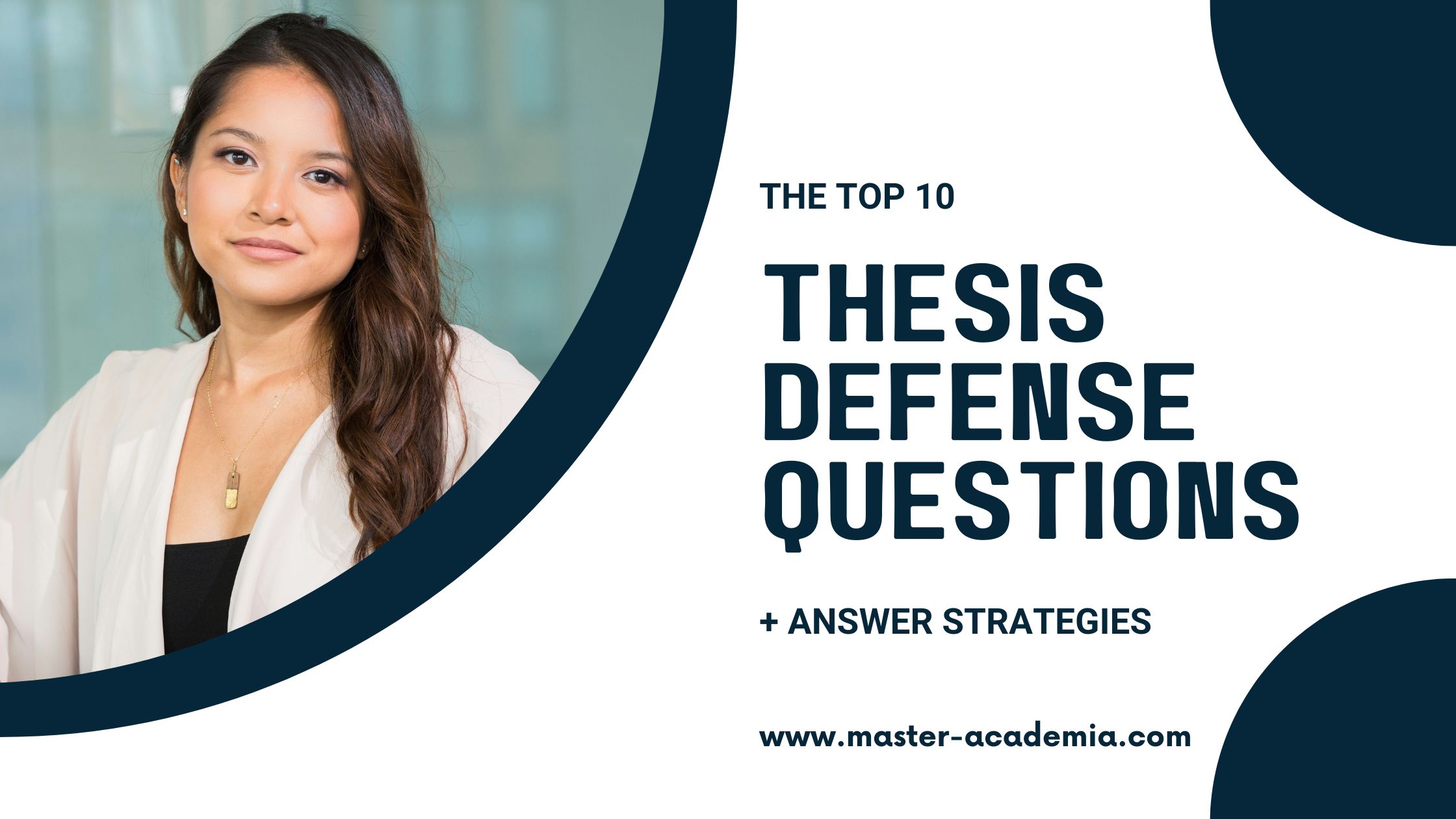
The top 10 thesis defense questions (+ how to prepare strong answers)
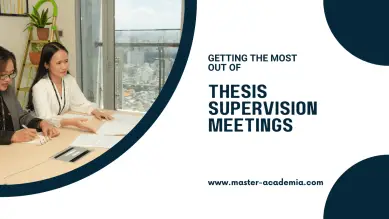
Getting the most out of thesis supervision meetings

How to prepare your viva opening speech

How to write a unique thesis acknowledgement (+ FAQs)
- PRO Courses Guides New Tech Help Pro Expert Videos About wikiHow Pro Upgrade Sign In
- EDIT Edit this Article
- EXPLORE Tech Help Pro About Us Random Article Quizzes Request a New Article Community Dashboard This Or That Game Popular Categories Arts and Entertainment Artwork Books Movies Computers and Electronics Computers Phone Skills Technology Hacks Health Men's Health Mental Health Women's Health Relationships Dating Love Relationship Issues Hobbies and Crafts Crafts Drawing Games Education & Communication Communication Skills Personal Development Studying Personal Care and Style Fashion Hair Care Personal Hygiene Youth Personal Care School Stuff Dating All Categories Arts and Entertainment Finance and Business Home and Garden Relationship Quizzes Cars & Other Vehicles Food and Entertaining Personal Care and Style Sports and Fitness Computers and Electronics Health Pets and Animals Travel Education & Communication Hobbies and Crafts Philosophy and Religion Work World Family Life Holidays and Traditions Relationships Youth
- Browse Articles
- Learn Something New
- Quizzes Hot
- This Or That Game New
- Train Your Brain
- Explore More
- Support wikiHow
- About wikiHow
- Log in / Sign up
- Education and Communications
- College University and Postgraduate
- Campus Life
- Interacting with Academic Staff
How to Email a Professor About Research
Last Updated: June 27, 2022 Fact Checked
This article was co-authored by Alexander Ruiz, M.Ed. and by wikiHow staff writer, Aly Rusciano . Alexander Ruiz is an Educational Consultant and the Educational Director of Link Educational Institute, a tutoring business based in Claremont, California that provides customizable educational plans, subject and test prep tutoring, and college application consulting. With over a decade and a half of experience in the education industry, Alexander coaches students to increase their self-awareness and emotional intelligence while achieving skills and the goal of achieving skills and higher education. He holds a BA in Psychology from Florida International University and an MA in Education from Georgia Southern University. There are 10 references cited in this article, which can be found at the bottom of the page. This article has been fact-checked, ensuring the accuracy of any cited facts and confirming the authority of its sources. This article has been viewed 16,367 times.
Asking a professor about their research is the first step in gaining a mentor, knowledge, and new opportunities—but how do you do it? Emails are an excellent way to professionally and academically introduce yourself to a professor and express an interest in their expertise. If you don't know the professor well yet, this can seem nerve-wracking, but don't stress! In this article, we’ll tell you everything you need to know about emailing a professor about research and even give you a few examples to work with.
Best Practice for Emailing Professors

- “Meeting to Discuss Biological Engineering for Targeting Cancer Cells”
- “Seeking Opportunity to Research Wollstonecraft’s Gothic Prose”

- “My name is Allie Springer, and I’m an English major in my final semester at the University of Tennessee.”
- “My name is Courtney Chaps, and I am currently a sophomore at MIT.”

- “I have read several of your articles. Your piece on orangutans in National Geographic opened my eyes to a different perspective I am now exploring in my own work.”
- “Your theory on the evolution and prevalence of knighthood within Medieval romance is fascinating and thought-provoking.”

- “My Capstone project mirrors your research on Edmund Spenser’s allegorical characterizations, but with a focus on female representation.”
- “Your emphasis on the cellular properties of viruses interests me the most because of my extensive history in the medical field.”

- “Although this thesis is my first active research project, I’m eager to learn and challenge the foundations of my research. I’m a hardworking student who has received numerous leadership and scholarly awards, including the Princeton Scholarly Essay Award.”
- “My first research project focused on leukemia inhibitory factor’s role in cell activation. I have also worked on several experiments related to genetic screening.” [8] X Research source

- “An apprenticeship with you during the spring semester would allow me to explore my thesis further.”
- “Are there any undergraduate research positions available in your lab?”

- “I would love to meet with you to discuss your groundbreaking research at your convenience.”
- “I am available to meet via Zoom and in-person Mondays through Thursdays from 3 PM to 6 PM PST.”

- “Kimmy Reeds 9011133 (555) 881-000 [email protected]”

- Try sending the email during the professor’s office hours for a more timely response.
Sample Emails

Expert Q&A
- ↑ https://salarship.com/article/email-professor-research-opportunities/
- ↑ https://academicpositions.com/career-advice/how-to-email-a-professor
- ↑ https://research.berkeley.edu/how-cold-email-professor
- ↑ https://www.purdue.edu/advisors/students/professor.php
- ↑ https://sites.psu.edu/gileswriter/2016/08/26/research-opportunity-please-how-to-email-a-professor/
- ↑ https://www.chem.purdue.edu/courses/chm49900/CHM499docs/499emailguide.pdf
- ↑ https://biology.nd.edu/assets/182128/example_of_emails_sent_to_a_professor_before_applying.pdf
- ↑ https://research.ewu.edu/writers_c_writing_email
- ↑ https://sciences.ugresearch.ucla.edu/getting-started/project/
- ↑ https://senr.osu.edu/undergraduate/undergraduate-research/dos-and-donts
About This Article

- Send fan mail to authors
Did this article help you?

Featured Articles

Trending Articles

Watch Articles

- Terms of Use
- Privacy Policy
- Do Not Sell or Share My Info
- Not Selling Info
wikiHow Tech Help Pro:
Level up your tech skills and stay ahead of the curve
- Med Devices & Surgical
- Cell Biology
- Pharmaceuticals
- Health Maintenance
- Safety and Security
- Engineering
- Advanced Materials
- Semiconductor
- Nanotechnology
- Water-Membrane and Separations
- Fuel Cell and Battery
- Manufacturing
- Environment
- Venture Capital
- Information Technology
- Franchise reports
- BCC Publishing
- Barnes Reports
- Transparency
- Future Markets Insights
- Market Research Studies
- Innovation Spotlights
- About BCC Research
- Custom Consulting
- Membership Benefits
- for Corporate
- for Academic
- for Commercialization
- Press Releases
- In the News

How To Write An Email To Your Professor—6 Copy-Paste Templates

Jun 25, 2022
Blog Academic Institutions How To Write An Email To Your Professor—6 Copy-Paste Templates
Do you ever struggle with what to say to a professor in an email? Writing an email to a professor requires more thought than sending a text to a friend.
It’s important to treat interactions with your professors in a mature, competent way. When you do that, your professors will be more inclined to help you. Plus, you’ll demonstrate to them that you can conduct yourself professionally—which will impress them and make them remember you for when opportunities arise, give them positive things to say about you in letters of recommendation and more.
Today’s blog will provide multiple email templates that you can use when emailing your professor in any of these common situations.
Scheduling a Meeting
If you want to schedule a meeting with a professor to go over an assignment, ask clarifying questions from class or questions about an upcoming exam, but can’t attend your professor’s regular office hours, use this template: Subject: Meeting About _____
Dear Professor (or however your professor address him/herself, i.e. Dr., first name, etc.) _____,
I hope all is well. I started working on my assignment for _____ and I just had a couple of questions to make sure that I am on the right track. I also wanted to ask a question about yesterday’s lesson on _____, as I was a little confused and I want to ensure that I fully understand the content for the test next week. I know on the syllabus you mentioned that you have available office hours at _____ but I am not able to make it. Will you be at your desk at _____ or _____. Thank you, _____ Asking How to Improve Your Grade on an Assignment or Exam
If you’re unsatisfied with your grade on a recent assignment or exam, here is a template that will help you ask your professor on how to improve or if there are any extra credit options. Even though you’re probably frustrated with your grade, make sure to email your professor in a kind, professional way. Subject: Extra Support on _____
Dear Professor _____,
I hope all is well and that you enjoyed your weekend. I saw that you posted the grades for our last reports. I was a little surprised and discouraged by my grade.
I was wondering if you offer any extra credit opportunities, revisions or if you have any advice for me on how to improve on a future assignment. Are you available to meet _____ or _____ to discuss my report and a plan? Let me know what works for you.
I look forward to hearing from you,
Best, _____
Requesting an Extension
If you’re having a really tough, busy few weeks and you have an important assignment coming up, but you need more time to complete it, here is a template on how to tell your professor what is going on and to kindly ask for an extension. Be very specific about why you need an extension. Everyone is juggling multiple priorities, so telling your professor only that you’ve been “stressed out, sick or busy” isn’t enough. Explain the specific barriers you’ve faced when trying to complete the assignment. Even better, attach a note from your coach, employer or doctor who can attest to why you need an extension. Subject: Extension on _____
I hope all is well. I have been extremely busy and stressed with assignments in other classes and with _____ (sports practice, on-campus job, other commitment, health condition, etc.). I do not think that I will be able to submit my best work to you with all of the other tasks on my agenda. I was wondering if you would consider granting me an extension on our upcoming project/paper and submit it by ______?
Asking for a Letter of Recommendation
If you know of a professor that you are close with or one who enjoys working with you, here is a template on how to ask for a recommendation for a future job or graduate school. Make sure that you give your professor at least two months’ notice so they have time to write a thoughtful recommendation.
Subject: Letter of Recommendation for _____
I hope all is well and that you had a great _____ (summer, winter break, fall semester, etc…) I am applying for a _____ (summer internship, full-time job, graduate program, summer program, etc…) at _____. I really value and appreciate how you have helped me grow as a student and cultivated my interest in ____. The position requires a letter of recommendation, and I was wondering if you would consider writing one for me? If you are able to write it, I will follow up with a deadline and any additional information. I have attached a resume and cover letter below as a reference. I look forward to hearing from you, Kind Regards, _____ Information about a Particular Class
If you’re picking classes for the upcoming semester and you have researched a few classes or are unsure what you want to choose, here is a template that will help you ask a professor for more details on a class. If you have never taken a class with this professor before, make sure that you fully introduce yourself. Subject: Information on _____
My name is _____ and I am a rising _____. I am trying to narrow down a few classes for the next semester. I am interested in _____ and I am considering majoring in _____. I was doing some research in the course catalog and I found your class. I am emailing you to see if you would consider sharing more details and potentially the syllabus on _____. Or, if you could refer me to a student who took this class who I could contact, that would be very helpful.
Thank you, _____
Personal Advice
If you developed a close relationship with a professor and you’re having a personal problem, here is a template to help if you feel comfortable enough to reach out to him or her.
Subject: Personal Help With _____
I hope all is well. I recently encountered/am struggling with _____ and I’d love to talk to you about it. Will you be available _____ or _____ so I can come in and discuss this with you?
Stay ahead of industry trends, build your market research strategy and more.
Recent posts.

Navigating the Landscape of Pain Management Drugs Market: Trends and Insights
1 min. read | Healthcare, Featured

The Global Autoimmune Disease Diagnostics Market: Insights and Trends
1 min. read | Pharmaceuticals, Featured

How Western Blotting Market Spells Success Through Advancements in Technology and Research
1 min. read | Biotechnology, Featured

Virtual Reality Technologies: A Gateway to Immersive Worlds
1 min. read | Information Technology, Featured

Written By Daniella Pascucci
Daniella is our Academic Insights Strategist and a current senior at Bates College. She writes about challenges facing college students and tangible ways students can thrive in their academic and professional lives.
Related Content

3 min. read | Academic Institutions
How To Choose A Market Research Vendor—For Tech Transfer And Innovation Offices
At this time of year, many of you are reviewing your budget and analyzing your m...
How To Choose A Market Research Vendor—For Schools And Universities
Happy Summer to our academic librarian audience! I hope you get to enjoy a bit o...

6 min. read | Academic Institutions
How to be Productive Over Winter Break - Pandemic Edition

Guiding smart decisions every step of the way
We are your trusted research partner, providing actionable insights and custom consulting across life sciences, advanced materials, and technology. Allow BCC Research to nurture your smartest business decisions today, tomorrow, and beyond.
BCC Research provides objective, unbiased measurement and assessment of market opportunities with detailed market research reports. Our experienced industry analysts assess growth opportunities, market sizing, technologies, applications, supply chains and companies with the singular goal of helping you make informed business decisions, free of noise and hype.
Stay Informed
- Custom Research
- Market Insights
- News & Events
- 781-489-7301
- [email protected]
Connect With Us
- 866-285-7215
Have a language expert improve your writing
Run a free plagiarism check in 10 minutes, generate accurate citations for free.
- Knowledge Base
Sample emails to your dissertation supervisor
Published on October 13, 2015 by Sarah Vinz . Revised on March 24, 2017.
Table of contents
Making an appointment, asking questions, confirming agreements.
Dear Dr. Janssen,
The college has informed me that you will be my supervisor. I would therefore like to make an initial appointment to discuss my dissertation idea with you.
I look forward to hearing from you as to when you would be available to meet with me.
Receive feedback on language, structure, and formatting
Professional editors proofread and edit your paper by focusing on:
- Academic style
- Vague sentences
- Style consistency
See an example

Dear Prof. Smith,
I have encountered several difficulties while working on my dissertation. Could you please answer the following questions?
- I have found only limited literature on the concept of “social enforcement.” Are you familiar with any authors who have written on this topic?
- Measuring “social enforcement” in the literature has proven virtually impossible. At this point I would like to use “social control” as a starting point for the concept. What are your thoughts on this?
I would like to make an appointment to discuss these questions with you. When would be convenient for you?
I am writing in follow-up to our meeting on Monday. Could you please check the notes I have prepared concerning what we agreed and confirm that they are accurate?
Thanks in advance for your response.
Cite this Scribbr article
If you want to cite this source, you can copy and paste the citation or click the “Cite this Scribbr article” button to automatically add the citation to our free Citation Generator.
Vinz, S. (2017, March 24). Sample emails to your dissertation supervisor. Scribbr. Retrieved April 15, 2024, from https://www.scribbr.com/tips/sample-emails-to-your-dissertation-supervisor/
Is this article helpful?
Sarah's academic background includes a Master of Arts in English, a Master of International Affairs degree, and a Bachelor of Arts in Political Science. She loves the challenge of finding the perfect formulation or wording and derives much satisfaction from helping students take their academic writing up a notch.
Unlimited Academic AI-Proofreading
✔ Document error-free in 5minutes ✔ Unlimited document corrections ✔ Specialized in correcting academic texts
- Search All Scholarships
- Exclusive Scholarships
- Easy Scholarships to Apply For
- No Essay Scholarships
- Scholarships for HS Juniors
- Scholarships for HS Seniors
- Scholarships for College Students
- Scholarships for Grad Students
- Scholarships for Women
- Scholarships for Black Students
- Scholarships
- Student Loans
- College Admissions
- Financial Aid
- Scholarship Winners
- Scholarship Providers
Student-centric advice and objective recommendations
Higher education has never been more confusing or expensive. Our goal is to help you navigate the very big decisions related to higher ed with objective information and expert advice. Each piece of content on the site is original, based on extensive research, and reviewed by multiple editors, including a subject matter expert. This ensures that all of our content is up-to-date, useful, accurate, and thorough.
Our reviews and recommendations are based on extensive research, testing, and feedback. We may receive commission from links on our website, but that doesn’t affect our editors’ opinions. Our marketing partners don’t review, approve or endorse our editorial content. It’s accurate to the best of our knowledge when posted. You can find a complete list of our partners here .
How to Email Your Professor (With Examples)

Lisa Freedland is a Scholarships360 writer with personal experience in psychological research and content writing. She has written content for an online fact-checking organization and has conducted research at the University of Southern California as well as the University of California, Irvine. Lisa graduated from the University of Southern California in Fall 2021 with a degree in Psychology.
Learn about our editorial policies

Every academic year, more and more professors complain that students do not know how to write nor respond to emails. Often, students are simply not taught how to write such emails to begin with. Some students are entirely clueless about what they’re doing wrong. To help make sure you don’t make these same mistakes, we’re going to show you how to email your professor (with examples)!
Keep on reading so that you can be confident in what you’re saying before you even hit “send.”
Emailing professors: A how-to guide
We’re sure that you’ve emailed people before, whether teachers, coworkers, friends, or family, but emailing professors is a little different. Emailing professors requires a level of formality not typically required when emailing people you’re already familiar with (yes, even if you know the professor well!). So, to make sure you don’t leave a bad impression on your professors, we’ve established a few tips that you should go by before sending off that email. Let’s get into them!
Don’t miss: How to ask for letters of recommendation
Be professional
Perhaps most importantly, you should be professional when emailing your professors. But, what do we mean by this?
Simply, being professional when emailing your professors means using proper grammar, not using slang or emojis, and using their proper title (we’ll get into what this means next).
Further, if you’re asking for an extension for an assignment, giving a heads-up as to why you’ll be missing class, or anything along these lines, try not to give away too much personal information as to why. For example, rather than saying you have a stomach ache or caught the flu, you can instead say that you came down with an illness. The exact sickness (or reason) is not the most relevant information. Your professor will probably be grateful not to know anyway.
Apply to these scholarships due soon

$10,000 “No Essay” Scholarship

$2,000 Sallie Mae Scholarship

$40,000 Build a College List Scholarship

Niche $25,000 “No Essay” Scholarship

$25k “Be Bold” No-Essay Scholarship

$10,000 CollegeXpress Scholarship

$1,000 Appily Easy College Money Scholarship

$5,000 Christian Connector Scholarship

$2,000 No Essay CollegeVine Scholarship
Include their title + name.
Time for titles! If you’re not familiar with what titles are, titles refer to the words used before or after a person’s name that indicate a person’s position or role. When it comes to professors, students normally use either the title “Doctor” (abbreviated Dr.) or “Professor.”
And, as normally comes after someone’s title, you should be sure to include their last name after. So, let’s say you’re emailing a professor called Susan Robinson. You could start the email off with something like:
“Dear Dr. Robinson,” or “Hello Dr. Robinson,” or “Dear Professor Robinson,” or “Hello Professor Robinson,”
All these are fine choices, and it’s entirely up to you to choose whichever you prefer. And, if you haven’t quite noticed, it’s quite common to use “Dear” or “Hello” when starting off an email to a professor, but these aren’t your only options (just common ones). Whichever you use is, once again, up to your personal preference!
Don’t miss: How to make a budget in college
Say something nice
Yes, really. It doesn’t hurt to be nice when emailing professors, especially when you’re asking for their advice or help.
So, how do you start out with something nice? Well, typically, after greeting your professor with their title and name (as we demonstrated above), you’ll add something along the lines of:
- “Hope you had a great weekend.”
- “I hope you’re enjoying the beautiful weather today!”
- “Hope you’re doing well!”
Make sense? Some professors appreciate such niceties. Not only will it indicate that you realize they have a life outside of academia, but it’s also just a polite thing to do. Yes, admittedly, some professors might not care, but others will!
Give context (i.e. who you are)
College professors have tons of students. So, oftentimes (if not always), they may need a little reminder on how they know you. This is especially true if you’re not in touch with them frequently. This is exactly what you should do next – explain who you are!
If you’re a student of theirs, the easiest way to do this is to mention what class of theirs you’re enrolled in, and what time it meets (or, if there are names for each section, you can mention that instead). This will give them some context before you ask a question, so they can understand exactly what assignment, topic, or question it is you’re asking about. This might go something like:
“This is *insert your name* from the Psychology 101 section that meets Tuesdays and Thursdays from 1-2:30 P.M.”
Alternatively, if you’re not a student of theirs, explain your desired relationship to them (e.g., are you interested in enrolling in their class? Do you want to work in their research lab?). If this is the case for you, this might look like:
“This is *insert your name*, a second-year student majoring in Psychology. I am interested in enrolling in Psychology 102 next semester, and… *can ask/introduce your question here*”
Now, unless you are 100% sure that your professor knows who you are by name, we definitely recommend you don’t skip this step! It may be awkward if your professor has to ask who you are after your initial email, so, better safe than sorry!
Last, but not least, try to use your university email if you have one! This immediately signals to your professor that you’re either a student or faculty member at their college. Your school email may make them more inclined to look at your email.
Don’t miss: How to make money in college
Be straightforward
Since they have so many students, professors also receive a lot of emails. So, when emailing them, make sure to get straight to the point (no beating around the bush!). Be specific about your question, and provide context if needed. If you’ve already tried to solve your problem or answer your question in a number of ways, mention these. Doing so will cut down the amount of unnecessary emails sent back and forth. Also, it will also help you understand what tips or advice they shouldn’t give you (as you’ve already tried them).
On a similar note, if you have a question about a test or due date, we highly recommend checking your class syllabus first. These will contain your important test and due dates 99% of the time, if not more.
And, most importantly, remember to make your subject line specific and clear. For example, if you have a question about an assignment’s due date, your subject line could be something along the lines of “Question about Due Date of Assignment Name .” This will make it clear to the professor what the context of the email is, and will help avoid any misunderstandings.
After asking your question (or saying whatever you needed to say), it’s time to sign off! Most commonly, people will do this by using a “Best,”, “Thanks,” “Sincerely,” or something along those lines, followed by their name. If your university email does not include your full name, write both your first and last name in your sign off. This will make it clear to the professor who you are, even if they have another student with the same first name.
Start your scholarship search
- Vetted scholarships custom-matched to your profile
- Access exclusive scholarships only available to Scholarships360 members
A few examples
Time for a few examples! Here they are:
1. If you’re asking a professor a question about an upcoming test date:
Hello Dr. Johnson,
Hope your week is off to a great start!
This is John Smith from your Chemistry 404 Monday/Wednesday/Friday 11 am – 12 pm class. Last Monday, you mentioned that our upcoming midterm is scheduled for September 25th. However, on the class syllabus it says that the test is planned for September 21st. I was wondering on which of these dates the midterm will be taking place?
Thank you in advance.
2. Generalized email to a professor:
Dear Dr. Last Name ,
Hope you’re doing well!
This is Your name from Your class at time . I had a question about * elaborate on the question.*
We hope that you’re now well-versed on how to write an email to a professor of yours. However, how do you go about cold emailing a professor for a research opportunity? That’s a great question! Let’s see.
How to email a professor for research opportunities
Luckily, the format for emailing a professor for research is not too different from that of emailing any professor. So, if you’ve already read all our tips above, you’re off to a head start. However, there are a few differences.
Components to include
Before we get into what makes an email to a professor for research different, we should first list the basic components of this type of email (as they largely overlap with a normal email to a professor). Any email to a professor (for research) should:
- Have an informative subject line
- Be professional and straightforward
- Include their title and name
- Include why you want to join their research lab (why you’re interested in their research specifically)
- Mention any previous experience (if applicable)
- Elaborate on why research is important to you/will help you reach your goals
- Ask to schedule a time to meet or discuss possible research opportunities
- Your resume and transcript (attached to the email!)
Since we’ve already covered most of these components above (under Emailing Professors: A How-To Guide), we’ll now be focusing mainly on the unique aspects of writing an email to a professor for research.
Don’t miss: All about graduate assistantships
Do your research!
If you’re interested in doing research, now’s your time to show off your skills! Before you go about emailing any research professor for an opportunity to work in their lab, you must first know what their lab studies. Doing this research will help you elaborate on why you want to join their specific lab, rather than any others, which will help you stand out amongst possible applicants (and will help you know if you’re actually a good fit for the lab or not!).
Why are you interested in their research?
After you’ve done research on the research of the professor you’d like to work with, use this information to detail what exactly about their research interests you. This can normally be done within 1-2 sentences, and should be specific – make sure to relate it to your interests and goals! This may look something like:
I am particularly interested in topic . I recently read your name/year of research paper on topic and developed an interest in your research. Specifically, I was fascinated by mention one of the findings of the research paper . If possible, I would love the opportunity to work in your lab to help contribute to further research on this topic during time frame.
If this seems a little confusing right now, don’t fret! We have some actual examples for later, so you can get an idea of what this section should look like when real topics and findings are included.
Ask to schedule a meeting
Now, it’s time to schedule a meeting (or, at least ask to)! After you go about mentioning what you find interesting about their research and expressing an interest in working in their lab, you should make a request to meet with them. There’s a few different ways you can do this:
- “ If you know of any internship, volunteer, or work positions available in research over the summer, I would love to set up a time to talk about these potential opportunities.”
- “If you have time, I would love to set up a time to talk about potential research opportunities.”
- “Would you be available to meet sometime this week to discuss your research?”
- “Would it be possible to meet with you to further discuss Topic and my possible involvement in research? I am available on Days and Times .”
Simple, right? After you ask to schedule a meeting, we highly recommend mentioning that your transcript and resume are attached to the email (and make sure to actually attach them). If you do not attach them, professors will often ask for them promptly afterwards (but not always).
Last, but not least, finish off the email with a nicety! You can do it more formally, with something like, “I greatly appreciate your time and consideration.” Or, you can do it more casually, with something along the lines of, “I look forward to hearing from you!”
Which way you choose is ultimately up to you – just make sure to be respectful!
More examples
Time for some more examples! These are real examples of emails written to professors, in which students were asking for research opportunities (although some names and info have been slightly altered). Here we go!
1. Email from a student without any prior research experience:
“Dear Dr. Lee,
I hope this email finds you well. My name is Abigail Thompson and I am a first-year undergraduate at the University of Minnesota, majoring in Psychology and minoring in Japanese. I am currently looking for opportunities to get involved with research over the summer.
Psychological research, especially that relating to social psychology, sounds very interesting to me, so I am hoping to get involved early into my undergraduate career. I have reviewed your faculty profile and am interested in name of the research paper , especially how you explored how people who have experienced traumas cope with what they’ve been through. If you know of any internship, volunteer, or work positions available in research over the summer, I would love to set up a time to talk about these potential opportunities. I greatly appreciate your time and consideration, and my resume and transcript are attached to this email.
2. Email from a student with prior research experience:
“ Dear Dr. Pudi,
I hope this email finds you well. My name is Jacqueline Fisher and I am a sophomore at UCLA, majoring in Psychology. I am currently looking for opportunities to get involved with research for this upcoming semester or over the summer.
Last summer, I assisted in research at the University of California, Berkeley, where we studied people’s psychological responses to traumatic events. I am also interested in developmental psychology and how your research studies the effects of marital conflict on children.
If you have time, I would love to set up a time to talk about potential research opportunities. I greatly appreciate your time and consideration, and my resume is attached to this email.
Have a wonderful time frame .
Jacqueline ”
Dear Reader,
You’ve now reached the end of the article!
I hope that this guide (and our example emails) have helped you gain the knowledge and skill of being able to email your professors (for class, research, or otherwise!). It’s sure to come in handy at some point, so, we wish you good luck, and send you off!
All the best,
Don’t miss: How to write an essay about yourself
Scholarships360 Recommended

10 Tips for Successful College Applications

Coalition vs. Common App: What is the difference?

College Application Deadlines 2023-2024: What You Need to Know
Trending now.

How to Convert Your GPA to a 4.0 Scale

PSAT to SAT Score Conversion: Predict Your Score

What Are Public Ivy League Schools?
3 reasons to join scholarships360.
- Automatic entry to our $10,000 No-Essay Scholarship
- Personalized matching to thousands of vetted scholarships
- Quick apply for scholarships exclusive to our platform
By the way...Scholarships360 is 100% free!
- Features for Creative Writers
- Features for Work
- Features for Higher Education
- Features for Teachers
- Features for Non-Native Speakers
- Learn Blog Grammar Guide Community Events FAQ
- Grammar Guide
How to Write an Email to a Professor (With Examples)

Hannah Yang

Table of Contents
How to email a professor in 7 steps, email to professor examples.
Emailing your professor can be a daunting task.
Writing professional emails is never easy, but composing an email to a professor can feel especially nerve-racking. After all, your professors have a lot of control over your academic success and your future career, so you don't want to make a mistake.
So, how exactly do you write a successful email to a professor?
In this article, we’ll give you a step-by-step guide for how to write an email to your professor, plus a set of email templates you can use.
We’ve broken the process of emailing your professor into seven simple steps.
Step 1: How to Write the Subject Line
Start by writing a clear, concise subject line for your email.
Your subject line should be specific to your situation. Ideally, your professor should understand why you’re emailing them without even having to open the body of your message.

For example, if you’re emailing to request an extension for a research paper, you can use the subject line “Research paper deadline extension.” Or, if you’re emailing to ask for a clarification about the syllabus, you can use the subject line “Question about class syllabus.”
Step 2: How to Address a Professor in an Email
You should start your email with a formal salutation.
You can use formal greetings, such as “Dear” or “Hi,” followed by your teacher’s preferred title, whether that’s “Professor [Last Name],” “Mr. [Last Name],” “Ms. [Last Name],” or simply “[First Name].”
If you’re not sure about your professor’s title, “Dear Professor [Last Name]” is always a safe bet.
Step 3: How to Start an Email to a Teacher
Start your email by introducing yourself and explaining which class you’re in. For example, you might write, “My name is Hannah, and I’m a freshman in your ENGL 453 class.”
It’s common for professors to teach multiple classes, especially at large universities, so they don’t always know all their students by name. If you’re emailing from your academic account, they’ll likely be able to see your full name in the system, but it’s still better to be safe than sorry.
Of course, if you’ve already established a working relationship with your professor, and they know who you are, you don’t have to introduce yourself. Instead, you can start your email with a friendly greeting, such as “I hope your week is going well” or “Happy Friday!”

Good writing = better grades
ProWritingAid will help you improve the style, strength, and clarity of all your assignments.
Step 4: How to Explain Your Request
Now that you’ve finished your introduction, it’s time to explain all the essential information about why you’re writing this message.
Professors lead busy lives, so try to keep the body of your email as concise as possible. Don’t use a whole paragraph when a single sentence would do.
Try to keep a professional tone while you explain your request. You don’t need to sound overly stiff, but you should generally avoid using slang or making jokes.
If you’re writing about an issue that includes personal details, such as a health issue or the loss of a loved one, it’s okay to be vague when explaining your reasons. Don’t feel pressure to include details about your personal life that you’re not comfortable sharing.
Finally, be specific about what kind of follow-up action you’re requesting from your professor, if any. For example, you can write, “Please let me know if it would be possible to extend the deadline,” or “Please send me your feedback on this draft at your earliest convenience.”
Step 5: How to End an Email to a Professor
You can end the body of your email with a simple expression of gratitude. You can write something like, “Thank you for your understanding and support,” or simply “Thanks for your time.”
Step 6: How to Sign Off an Email
Sign off your email with a simple closing salutation, followed by your first name.
Keep it simple and polite. Popular choices include “Best,” “Thanks,” “Sincerely,” and “Regards.”

Step 7: Edit Your Email with ProWritingAid
You don’t want to send your professor an email riddled with grammar mistakes, especially if it’s your English professor! And even if they teach a different subject, like math or biology, you still want to make sure you’re putting your best foot forward.
Editing your email with ProWritingAid can help you avoid mistakes. Our editing tool will correct grammar errors, spelling typos, and weak word choices.
You can even ask the tool to help you ensure you’re using a formal tone so your email doesn’t come across as casual or unprofessional.
Now that we’ve gone over the seven steps for writing an email to a professor, let’s look at some examples.
Here are some email templates you can use, depending on your specific situation.
Sick Email to Professor Example
Subject line: Missing class today
Dear Professor [Last Name],
My name is [your name], and I’m a student in your class [class name]. I’m writing to let you know that I won’t be able to make it to class today, due to health issues. [Insert details if needed].
Please let me know what material we’ll be covering so I can make it up before the next class.
[Your name]
Sample Email to Professor Asking for Help
Subject line: Help with [class name]
My name is [your name]. I’ve been really struggling with your class [class name] this semester, and I’m having a hard time understanding [details].
Would you have time to sit down with me and help me better understand the material? I would welcome any support you can offer.
Thank you in advance! I look forward to hearing from you.
How to Email a Professor About a Grade
Subject line: My grade for [assignment/exam name]
I hope your week is off to a good start!
I recently received my grade for [assignment/exam name], and it was lower than I expected. Could you please tell me where I lost points?
I know you have a busy schedule, but I would really appreciate more details, since I’m sure that information could also help me improve my grades in the future.
Thank you so much for your time!
Sample Email to Professor for Research
Subject line: Research opportunities in your lab
I hope you’re doing well!
My name is [your name], and I’m a [year, major]. I’m writing to ask about research opportunities in your lab next semester.
I’m really interested in the topic you’re researching because [details], and I have experience conducting research with [previous experience, if any].
Please let me know if you have any openings that might be suitable for me. I look forward to hearing from you!
How to Write an Apology Email for Missing a Class
Subject line: Missing class yesterday
I hope your week is going well.
I’m writing to apologize for missing your class [class name] yesterday. I was unable to attend because [details].
I know it was an important class and that I shouldn’t have missed it. I’ll do my best to ensure this doesn’t happen again. Thank you for your support and understanding.
Extension Email to Professor Example
Subject line: Extension for [Assignment Name]
My name is [your name], and I’m a student in your class [class name]. I’m writing to request an extension for our assignment about [assignment details].
I’ve been struggling to complete the assignment in time because of [reasons]. I would really appreciate it if you could extend the deadline to [new deadline date], due to my situation.
Please let me know if that would be okay. Thank you so much for your flexibility.
Thanks again,
How to Write a Follow-Up Email to a Professor
Subject line: Follow-up re: [subject]
I recently emailed you about [topic].
I’m just writing to follow up on my previous email and make sure you’ve received it. If you have, please let me know when I can expect a reply.
Thank you again for your time!
Warm regards,
How to Email a Professor About Getting Into Their Class
Subject line: Joining your class [class name]
My name is [your name], and I’m a [year, major] at [school name]. I’m interested in joining your class [class name]. I’m really fascinated by [topic] because [reasons], and I’ve heard that your class is a must-take class for students interested in [topic].
I don’t know how much demand there is for the class, but I’m curious if there’s anything I should do in advance to increase my chances of getting into the class.
Thank you for your consideration! I look forward to hearing from you.
There you have it—our guide for composing a clear and professional email to a professor.
Good luck, and happy writing!
Hannah is a speculative fiction writer who loves all things strange and surreal. She holds a BA from Yale University and lives in Colorado. When she’s not busy writing, you can find her painting watercolors, playing her ukulele, or hiking in the Rockies. Follow her work on hannahyang.com or on Twitter at @hannahxyang.
Get started with ProWritingAid
Drop us a line or let's stay in touch via :
How to Email a Professor: 11 Tips from Real Professors
#scribendiinc
Written by Jes D.A .
Email etiquette is a common struggle for students. It's important to nail down, though, because the professors on the other end of your emails are etiquette professionals. And while that's a little more than intimidating, it also means that we can go directly to the source—real-life professors!—to learn how to email a professor.
The professors we contacted gave comprehensive responses full of wonderful and thoughtful feedback that will help students write better emails. Many themes recurred, and it was often easy to tell that the professors had strong feelings about certain etiquette matters.
From tips on salutations to content and everything in between, these professors have provided advice to help you with emailing your professors based on real-life scenarios.
They've seen the worst of your emails; they've seen the best of your emails. So what's the takeaway?
1. Have a firm grasp of the English language
It's important to be self-aware when you're composing an email. If you have a firm grasp of the English language, you should be able to write a grammatically correct email in which everything is spelled appropriately, the word choice is academic, and the tone is appropriate.
However, the English language is tricky, and nailing down the minute details can be difficult. If you struggle with grammar or tend to overlook errors, it will be difficult to communicate professionally with your professor. As such, you may wish to have your writing proofread to ensure that your email is completely error-free.
Dr. Brandon Gilroyed, an anaerobic digestion and biofuel research assistant professor at the University of Guelph Ridgetown Campus , notes the importance of proper spelling and grammar when emailing a professor: "I have seen plenty of emails written entirely in lowercase and without any punctuation, likely because the message was written on a smartphone."
While writing on your phone might be more convenient, Dr. Gilroyed states that it still denotes poor etiquette. "It is difficult to take the sender of a message riddled with spelling and grammatical errors seriously," he says.
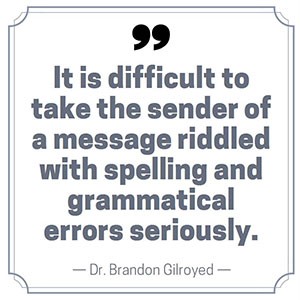
Dr. Ted Vokes, an adjunct faculty member in the Department of Psychology at the University of Windsor , has taught more than 100 courses, between the Department of Psychology and the Odette School of Business. So he understands the difference between a well-written and poorly written email. He says, "If it's worth sending the email, it's worth reading over before one sends it. I really want to help students, but if I can't understand the question, I am at a loss as to how to help."
2. Look over your email address
Here's another tip where self-awareness is key. Email using your student email address, if you have one. If you don't or you can't use it for some reason, be very conscious about what your private email address is communicating to your professor. I had to change the email address here for privacy reasons, but I can tell you that Dr. M.J. Toswell, a professor in the Department of English at Western University , noted that she once received an email sent from an account as unprofessional as "[email protected]," which is her "best example of a bad email account." Agreed!
Clearly, an email address like this doesn't send a professional message to your professor, and etiquette is all about professionalism. However, there's an even bigger problem with using private email accounts: spam filters. Dr. Toswell recounts:
My all-time favorite was a sequence from last year, on a Friday evening. The first email at 8 p.m. asked me whether an assignment was really due online on Monday night. The second email at 9 p.m. asked why I hadn't answered the first email yet. Both were addressed "Hey" and sent from a private email address that landed in my spam so I didn't see them until Saturday morning, and nearly deleted them because the subject line was blank too.
So the best-case scenario is that you lose that much-needed professionalism, and the worst-case scenario is that your email winds up unread. Be very aware of the email address you use to email a professor, and carefully consider what it might be communicating.
3. Check the syllabus before you start emailing
Most of the professors noted that students often already have the information they're seeking before they send an email. Dr. Toswell emphasizes that her "biggest woes" are related to the importance of checking the information that's already available to you before you start sending emails.
She notes that students often ask where or when exams are, what content is included on exams, or even to be exempt from exams, all just hours before an exam is set to begin. Dr. Toswell says, "It's hard to explain politely that the course materials, the syllabus, and my in-class discussions have covered these issues, and they should look at the website."
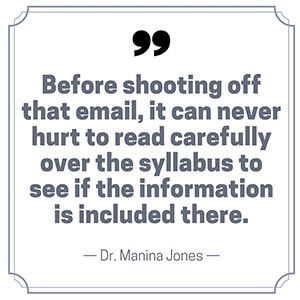
She advises, "Before shooting off that email, it can never hurt to read carefully over the syllabus to see if the information is included there." This will ensure you won't come across as inattentive or lazy to your professors, which will not give the best impression if you're asking a question or requesting a favor. Dr. Jones also hints that checking the syllabus also applies to salutations: "Often the syllabus will give the professor's preferred form of address." On that note . . .
4. Overthink the salutation
Since the salutation of an email is usually only a couple of words, it's easy to overlook. However, the salutation requires careful consideration, especially since it's the first line of your email.
First, make sure you include one! "I have to say that the lack of any salutation (launching right into 'I want . . .' or 'Where is . . .' or 'Can I . . .') . . . is the quickest way to get my back up before I even read the body of the message," Dr. Jones states. Some kind of greeting comes off as more friendly, polite, and professional.
Dr. Gilroyed notes that it's common to get emails that are too casual, beginning simply with "Hey." Dr. Jan Plug, Associate Professor and Director of the Centre for the Study of Theory and Criticism at Western University, agrees that students should avoid addressing their professors this way. He states, "Of course, all of this depends on how well the student knows the professor, but when starting a conversation, a bit too much formality might not be too much." He suggests using a simple "Dear" or "Hello" instead. "Things may get more familiar over time, but you really can't go wrong starting off in this way."
Dr. Vokes notes that a casual greeting, though, can be appropriate in some situations. Consider how well you know the professor. If you've already corresponded with this professor through email and in class, you may wish to use a more casual greeting. Dr. Vokes states, "I'm totally fine with 'Hi Dr. Vokes.' I set a casual tone in class, so I'm pleased when students feel comfortable to ask questions via email or in person in this manner."
He notes that there's a fine line, though: "What I never appreciate is something like 'Hey! Is there class tonight?' Once I even had a student send me an email which said, 'Hey, dude . . . do we have to come to class today?' (it was snowing out)." He suggests that it doesn't give the best first impression to receive an email that begins, "Hi Ted." Dr. Jones agrees: "I've often had emails starting 'Hey' or 'Yo!' or 'Dude!' This is fine for friends but not appropriate for an email to your professor."
5. Address your professor appropriately
The way you address your professor communicates something both about you and about the person you're emailing, so it needs attention. Dr. Jones notes that your email "requires a formal salutation and a recognition of the professor's professional status (and your own!)."
In addition, Dr. Plug says that "students can tend to be too familiar in their email style too quickly." You need to address your professor correctly, of course, carefully considering his or her title. If your professor has a doctorate, he or she might not want to be called "Professor." Similarly, he or she might not appreciate a "Mr." or "Mrs." and might prefer being addressed as "Professor."
It's also best to avoid gendered addresses. The female professors contacted often cited taking issue with the address of "Mrs." Dr. Jones states it is "a particularly irritating salutation because it makes assumptions about my marital status and gender role." Similarly, Dr. Toswell notes that she hates being called Mrs. Toswell so much, "it's visceral." That's definitely not the kind of reaction you want to garner from a professor!
In the same way, addresses like "Sir" can come across as unprofessional in emails to your professor. "I often get 'Sir,' which is fine, but it clearly conveys to profs that you still think you are in high school," Dr. Vokes notes.
Dr. Vokes does say, however, that he understands how addressing professors appropriately is confusing to students: "Not all professors are doctors . . . and not all doctors who teach are professors . . . . I'm sessional, but because I've been made an adjunct, both are accurate. Then, of course, senior graduate students who teach are neither, and 'Mr.' or 'Ms.' is appropriate." It's confusing, but that also means that, when you get it right, your professors will both notice and appreciate your time and effort in addressing them correctly.

6. Err on the side of being too formal

In addition, spelling the professor's email address correctly is vital. Dr. Jones states, "Because my last name is common, I've even had emails meant for another professor altogether," so make sure you check that you have the appropriate address.
On actually using your professor's name in the email, Dr. Gilroyed notes that greeting a professor by his or her first name is fine if it's agreed upon in advance, but doing so otherwise is improper email etiquette. He says, "The first email communication between student and professor is not a good time to begin using the first name."
When in doubt, Dr. Jones notes that professors will tell you outright if they prefer to be addressed by their first name. If you're still unsure, she advises that "the more formal choice of salutation will never offend, and then you can be corrected (it's easier to say, 'Please call me Bob' than it is to say, 'Um, I'd rather you didn't call me Bob')."
Dr. Plug also notes that, after the first email, you can begin to follow the professor's lead, and Dr. Jones agrees. In my original email to Dr. Jones, I addressed her as "Dr. Jones," safely choosing a more formal address. After she signed off as "Manina" in her reply, it was safe to assume I could henceforth address her as "Manina," which I did in my subsequent emails. She took note of this in returning tips to me, so it actually works! Reading signs carefully will help you to choose the correct address.
7. Provide enough background information
When emailing professors, you have to remember that they receive tons of emails every day. These emails come from different students in different classes, sometimes in different faculties, or even from different campuses.
When you email your professor and don't identify yourself properly, your professor might have trouble placing you. Being remembered when you're just one student in a huge class is an even greater concern if you have a common name. Dr. Gilroyed notes that "in larger classes, there might be three students named Matthew or five students named Jessica."
Dr. Jones similarly states that she sometimes teaches many big classes in the same semester and that knowing the name of every student is difficult. That doesn't even include problems across different classes or sections! So it's imperative that you place yourself exactly and fully. Including your first and last name, class, class time and day, and section number will help a professor to place you correctly. Dr. Jones notes that you can also provide context in terms of continuing a previous conversation or building on a topic you've already discussed in person.
In addition, you have to provide background information in terms of the actual topic at hand. Dr. Gilroyed says, "Students often write emails in which they immediately focus on a very specific topic or detail without providing any context or preamble. While the content of the message may be perfectly clear to the student, a professor who has dozens or hundreds of students may need more information to understand the scope of the student's query." He also notes that fully explaining a situation is "better than assuming your professor will know or remember every detail immediately."
8. Note the difference between being casual and being careless
If you've already emailed and spoken to your professor and have established a more casual correspondence, your messages might read awkwardly if they're too formal. Professors encourage being casual in this case. However, it's vital to note the difference between being casual and being careless.
You should never resort to texting language. Obviously, it's unprofessional. Dr. Gilroyed notes, "Use of this kind of language communicates to me that a student doesn't wish to spend the time to construct a proper message, yet they will often want me to spend my time reading the message and then doing something for them."
Similarly, Dr. Jones says that it's inappropriate to use short forms and emoticons. This also means the difference between correctly written English and emails riddled with typos. Dr. Vokes comments that, after a respectful salutation, "clear and respectfully written information in the body of the email needs to follow." There's a difference between a casually written message and an incorrect and careless one.
There's also a difference between being casual and being careless in terms of content. Your professor does not want to know too much information; even if he or she is friendly with you, some talk should be reserved for friends only. For example, Dr. Jones notes that she receives emails from students offering excuses for missing class that simply give too much information. "I don't need to know that a student's friends threw him a birthday party and he's hung over and wants to write a make-up test, or that she's decided to take a long weekend, or was stuck in traffic," she says.
9. Don't ask the dreaded question
Though this tip isn't directly related to email etiquette, it's been included because it was mentioned by multiple professors without prompting and it does concern the content of your email. Several professors noted a certain question they're commonly asked that drives them absolutely nuts. Students who miss class will often ask, "Did I miss anything in class on Monday?" Dr. Plug says, "I always want to say, 'No, we did absolutely nothing, as usual.'"
Dr. Jones notes that the same question is "the great bane of all professors." She offers this poem that tackles the subject. Why is it such a terrible question, though, and what makes it so inappropriate? Professor Jones offers an answer:
First, it's insulting to imply that the content of any class might not have been important, or that it can be recapped in a short email—and second, it's not the professor's responsibility to offer multiple iterations of the class. If you miss a class without a legitimate reason, it's your responsibility to arrange for access to notes from another student and/or find out what was covered.
Clearly, it's best to avoid this question!
10. Acknowledge your gratitude
Before you sign off, it's important that you include a valediction—that is, a complimentary farewell. Dr. Jones notes the importance of a valediction in proper email etiquette, even if it's just a quick statement like "Thanks for your help!" She says, "It does pay to acknowledge that if you're asking for something (even if it's just information) that your professor deserves some recognition of his/her time and trouble."
Instead of launching directly into what it is you want to request from your professor, you can acknowledge your gratitude or how busy he or she is. Doing so is a nice little way to recognize the professor's efforts in replying to your emails, and the gesture will be appreciated. Dr. Jones provides an example of an effective valediction: "Try something like 'I know you're busy, but I'm hoping you'll be able to make some time to meet and go over my answers on the quiz.'"
It might seem like a small or insignificant note, but it can definitely help your email to be received in a positive light and paint you favorably, especially amongst a slew of emails that don't include valedictions. Dr. Vokes notes, "From research, we know that first impressions very much affect a person's desire to be of assistance." If you make a good first impression, your professor will be more likely to help you, or, at the very least, they will be happier to help you.
11. Carefully consider your signoff
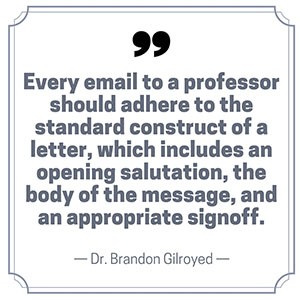
Dr. Gilroyed states, "Every email to a professor should adhere to the standard construct of a letter, which includes an opening salutation, the body of the message, and an appropriate signoff." That's why using an improper signoff, or no signoff at all, is bad email etiquette and should be avoided. A simple signoff is fine; try to balance being casual and professional.
You can also use your signoff to further distinguish yourself among a sea of students. Dr. Gilroyed notes that students should sign off "with an appropriate closing salutation and then a full name." Again, professors receive many emails every day. Some are without signoffs, and some use only first names. Including your full name will help your professor recognize and identify you quickly and easily.
Putting It into Practice
Okay, now that we have a list of email etiquette tips from real professors, how about putting them into practice? Here's an example of an excellent email to a professor:
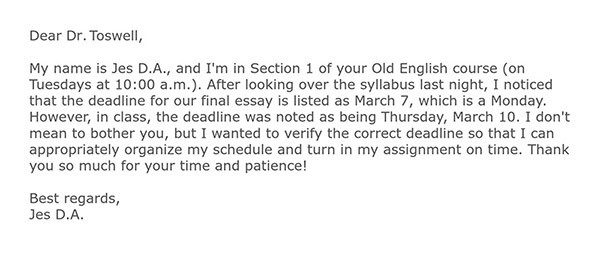
An email isn't just a piece of correspondence. It's an exercise in communicating well, and you're judged by it. Using this advice from real professors about how to email a professor, you can be judged favorably. Dr. Gilroyed says, "I cannot speak for all professors, but I certainly take notice when I receive a well-constructed email from a student. It shows me that they care enough to put in the effort to compose a proper message and they respect my time."
Even better, you can use emailing a professor to your advantage by asking genuine and intellectual questions. As Dr. Toswell explains, "Don't use up what I think of as your email currency (there's only so much bandwidth in my brain for one student and her questions unless they genuinely engaged with the course material) on bad inquiries." What's more, you can use these questions to form a bond with your professors. Dr. Toswell further says, "Email in order to establish a connection, and make it a solid one." If your email follows these tips, you'll no doubt be able to establish a connection that lasts through university and beyond.
Special thanks to all the professors who shared their email etiquette tips with us for this article. Your time and insights are much appreciated!
Image source: Nosnibor137/BigStockPhoto.com
Send Professional Emails
Hire an expert academic editor , or get a free sample, about the author.

Jes is a magician and a mechanic; that is to say, she creates pieces of writing from thin air to share as a writer, and she cleans up the rust and grease of other pieces of writing as an editor. She knows that there 's always something valuable to be pulled out of a blank page or something shiny to be uncovered in one that needs a little polishing. When Jes isn 't conjuring or maintaining sentences, she 's devouring them, always hungry for more words.
Have You Read?
"The Complete Beginner's Guide to Academic Writing"
Related Posts
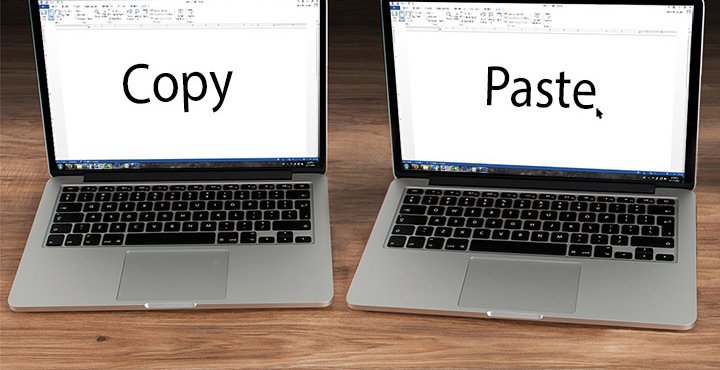
How Do I Know If I'm Plagiarizing?

The Ultimate Essay Checklist

Writing Your First College Essay: The "A" Is Easier Than You Think
Upload your file(s) so we can calculate your word count, or enter your word count manually.
We will also recommend a service based on the file(s) you upload.
English is not my first language. I need English editing and proofreading so that I sound like a native speaker.
I need to have my journal article, dissertation, or term paper edited and proofread, or I need help with an admissions essay or proposal.
I have a novel, manuscript, play, or ebook. I need editing, copy editing, proofreading, a critique of my work, or a query package.
I need editing and proofreading for my white papers, reports, manuals, press releases, marketing materials, and other business documents.
I need to have my essay, project, assignment, or term paper edited and proofread.
I want to sound professional and to get hired. I have a resume, letter, email, or personal document that I need to have edited and proofread.
Prices include your personal % discount.
Prices include % sales tax ( ).

Writers' Center
Eastern Washington University
Writing an Effective Email to Your Professor
Writing an effective email, ineffective and effective emails.
[ Back to resource home ]

[email protected] 509.359.2779
Cheney Campus JFK Library Learning Commons
Spokane Campus Catalyst Building C451 and C452
Stay Connected! Instagram Facebook
It is important to know how to communicate effectively to your professors through email. An email to a professor should be clear and professional.
Here is an example of an ineffective email from a student:

Below is one approach to revising the ineffective email:

SUBJECT: Be sure to utilize the “subject” field in an email. This immediately orients your professor regarding the email’s content. It can be especially helpful to include the name of the course and the section number.
SALUTATION: This greeting line is known as the “salutation.” Since this is an email to your instructor, it’s better to err on the formal side. Begin your email with “dear” rather that “hi,” and address him or her as “Professor Jones” or “Dr. Jones” or “Instructor Jones” (whichever is accurate).
BODY OF THE EMAIL: Before writing the email, gather your thoughts. Make sure you know what your objective is for sending this email:
Why are you writing?
What are you asking of your instructor? Is there a deadline?
Also, do your “homework.” Show the professor that you’ve done a little sleuthing before you emailed him or her to figure out what you may have missed (for example, try checking the syllabus).
PROFESSIONALISM: Treat school like it’s your job (or one of them). Communicate to your professor as you would your supervisor at work. Be respectful and mindful of their time. This is a person who could write you a letter of recommendation one day.
Also, check for misspellings, grammar mistakes, or punctuation goofs.
FULL NAME: Be sure to include your first and last name. Yes, your name may be part of your email address, but save the professor some time by identifying yourself in the email (especially if your email is [email protected] while charming, this does not identify you to your professor).
Curious about the differences between “CC” and “BCC” when emailing? Not sure about the appropriate time to use these email fields? Click HERE for more information.
- Last Updated: Jul 21, 2021 3:04 PM
- URL: https://research.ewu.edu/writers_c_writing_email
- Skip to primary navigation
- Skip to content

- Home – AI for Research

How to email professors about research
Writing an e-mail should ordinarily be a simple task. But while writing an e-mail is nothing to lose sleep over, a message to your thesis professor or supervisor inquiring about research work deserves careful planning and appropriate choice of words. If not written properly, your e-mail might end up making a wrong impression on the professor which can influence his judgment of you when the research work eventually commences.
To make sure your e-mail gets a reply and your research work takes off according to schedule, writing a well structured inquiry e-mail is very important. Quite often students don’t pay the attention it requires to carefully frame the content of the mail. There are some important tips, and dos and don’ts to be followed while writing a formal e-mail. Writing an effective mail plays a very important role in securing the position you want.
This article looks at the various aspects of an official e-mail and proffers some useful advice on how to write it effectively.
Keep it formal
Try sending the mail to the official address of the professor since it is an official rather than a personal matter. While it is common practice to send the mail to the professional account of the professor, some students may want to make it personal. While it is not a crime to send a private mail, sending your mail to the professor’s university-approved address seems more logical and sensible and can make the professor perceive you as such. Such impressions can help your course in several ways.
Make your subject clear
It is probably the most important part of the e-mail and also, quite often, the one least attention is paid to. Most professors are usually very occupied with various kinds of official tasks on a simultaneous basis. This means that they might not always be in a position to read every mail in its entirety. Therefore, clearly stating the subject of your mail (rather than leaving the space blank) will enable the professor to quickly have an idea of the message you want to convey.
One sentence is usually enough to achieve this. For example, the subject of your mail can be – “inquiry about when to commence my PhD thesis for the 2021/22 session.” With such a heading as your subject, the professor immediately has an idea of your message and can even send you an instant reply without bothering to peruse all of your mail.
The Salutation
It goes without saying that you need to follow the conventions of formal writing when sending an e-mail to a professor. Hence, you should also avoid writing anything that might make the professor see you as disrespectful and arrogant. Some countries are stricter than others when it comes to whether or not you should adress your professor by their titles or their names. In the Nordics for instance, it is extrememly uncommon to adress anyone by their title, and instead one is very informal using the persons first name. In many other countries, it is seen as disrepectful not to use the title in adressing the person. In some countries, such as Germany, it considered a serious faux pas to omitt the persons title in formal messanging. If you live in a country like that, you should avoid addressing the professors as Mr/Mrs and instead use their title or an abbreviation of it. For example, Good morning Professor Jones.
“Dear” is also an acceptable form of salutation for formal letters so either dear or hello can be used. Using a colon after the salutation instead of a comma is also ideal since it is a formal mail.
The introduction
You could write a small greeting like “I hope all is well with you and your family” after the salutation. The first thing you need to do after that is to properly introduce yourself. Clearly mention who you are. For instance, “I am_______, a PhD student in your department ________ studying ____.”
The main body
The main objective of your mail is to inquire about a timeline for your proposed research work. This should not take more than a few words so do not bog down the professor with an unnecessarily lengthy story. The shorther and to the point, the better. It’s not uncommon in academia to be buried in work and the last thing someone wants to do is read through an email message that reads like a novel. If you are emailing a professor who has been assigned to you and there is a formal document about his/her selection to supervise you, ensure you attach a copy of it to your mail. You can then politely inquire about how they intend to co-ordinate the project, including when to commence the research work and possibly a holistic timeline for the entire thesis. Also, ask for the possibility of a face-to-face meeting and a likely date for such a meeting if it is possible.
If you are intending to message professors you do not know about a potential research position, my advice would be to instead find someone you have worked with before who can vouch for you, or someone with whom you share a mutual connection. Warm introductions work a lot better than a cold emails, as these tend to be discarded.
Having provided the main thesis of your mail, your closing formalities should follow the same polite tone as other sections. You can start by thanking them for finding time to read your mail and then kindly appeal for their assistance in areas like choice of topic as well as provision of research materials and overall guidance throughout the course of the thesis. You then end by wishing them a nice day.
Signing Off
You can sign off by following the standard conventions of formal writing.
- Ensure that the mail is focused on the topic of research
- Be polite and respectful
- Keep the e-mail short, simple and specific
- Take care of the time zone the professor is in (if necessary). Try sending the mail during office hours to avoid the risk of the mail going unnoticed
- It may not be a good idea to send the e-mail on a weekend since there is a chance of it going unnoticed
- You can consult a senior colleague who has conducted similar research work with the same professor previously to learn more about them
- Use formal language
- Be honest – do not give any false information
- Revise, proofread and edit the mail to avoid any logic, typing, and/or grammar mistakes
- Avoid slang words and/or emoticons
There are a number of reasons that may necessitate an email to a professor inquiring about research work. For instance, your mail could be because there is no face-to-face access to the professor since your institution is on a holiday break (but about to commence a new semester). It could also be because you live in a city far from your post-graduate institution and hence do not frequently travel to the campus. Lastly, in these days of the coronavirus and lockdowns, an email mail might be one of the few opportunities of interacting with your thesis supervisor. Whatever prompts you to write, the guides/tips above should help you craft an ideal mail.
You may also like

- Organization & Planning
Avidnote: Your Ultimate Tool for Efficient Thesis Writing
Avidnote: Streamline Your Thesis Writing with AI. Write faster, summarize text, analyze data, and transcribe interviews. Sign up now and revolutionize your thesis writing experience.

5 Quick Steps to Find Relevant Information on Google Scholar
Discover how to find relevant information on Google Scholar in just 5 quick steps. Enhance your research journey with valuable tips and strategies. Click to optimize your search on Google Scholar now!
Leave a comment Cancel reply
Save my name, email, and website in this browser for the next time I comment.
Privacy Overview
Adding {{itemName}} to cart
Added {{itemName}} to cart
- University Home
Search form
Undergraduate research opportunities.
- Research Ethics
- Preparing for Undergraduate Research
- UCSC Divisions
- UCSC Academic Options
- The Independent Project Option
- Join a Lab or Research Group
- Examples of Emails to Professors
- Other Research Opportunities
- STEM Summer Research
- UCSC Undergraduate Research Awards
- Application Tips & Deadlines
- What's Next?
- For Students
How to Email a Professor Regarding Research
Your email should:.
- have an informative subject line
- be formal: Dear Dr. Smith; Sincerely, Your Name
- not use Mrs. or Ms.
- NOT have slang, abbreviations, or emoticons
- address any qualifications the professor is looking for
- demonstrate your experience
- state specifically your interest in that research group (you need to read the professor's website)
- explain why research is important for your goals
- ask to schedule a meeting or say that you will be coming to office hours
DO NOT SEND THIS EMAIL
Generalized from an email to a UCSC Professor
Hi Joe,
My name is Name and I am a major in Major . Is there space in your lab for an undergraduate? If so, what is the pay rate?
Thanks, Name
DO SEND AN EMAIL LIKE THESE
General email to a stem professor.
Subject: Meeting to discuss undergraduate research opportunities in topic
Dear Professor X ,
I am a year student at university majoring in major . How you found out about the professor's research . Expression of interest in specific paper or topic. I would appreciate the chance to talk with you about your research in topic of interest and about possible undergraduate opportunities in your lab.
My experience in research experience or class, confirmed my intention to develop my research skills and goal. I know you are very busy. We could schedule an appointment or I can drop by your office hours on day and time .
I have attached my resume and unofficial transcript. Please let me know if there is any other information I can provide. I look forward to talking to you soon.
________________________________
Generalized from an email to a UCSC professor
Subject: Possible undergraduate research opportunities
I am a (year, major) at (university) and I am writing to ask about opportunities for undergraduate research in your lab beginning (time period) . I have conducted undergraduate research on (topic) with (names) in (program or class) . (Expression of interest in the topic) . I would like to continue a path of research on (topic) and would ultimately allow me to (career goal) . I am especially interested in your previous work on (describe a paper or talk) .
I have attached my CV and unofficial transcript to this e-mail, but if there is additional information that I have not included that you would like, I would be happy to provide it to you. Thank you for your consideration.
Your Name Email address
________________________
From University of Virginia, How to Sucessfully E-mail Professors
Dear Dr. Smith, My name is X and I'm a second year biology major at UVa. In my introductory and upper-level coursework, I've developed a passion for science and am extremely interested in pursuing independent research as an undergraduate. An extensive research experience will greatly help me consolidate my future career choice. I am personally greatly interested in the molecular biology of stem cells. Recently I read your 2011 paper on the role of microRNAs in the differentiation of muscle stem cells and became fascinated by your work. In particular, I found it amazing that microRNAs can alter the fate of a cell in such a profound way. If possible, I would love to start working on a long-term project in your lab beginning this summer. Would you be available to meet sometime this week to discuss your research? I would also be happy to volunteer in your lab for a few weeks before we commit to anything to see if this is a good match. My transcript and resume are attached in case you are interested. I look forward to hearing from you! Thank you, X
_________________________
Template from UC Irvine
Dear Professor X :
My name is Peter Anteater , and I am very interested in becoming involved in research in Subject Area . I am a X year student with a GPA of X . I have taken Courses and Additional Experiences . My goal is to Goal .
I have reviewed your faculty profile and am interested in the work that you have done. I was intrigued by your journal article, "Article Title." It Additional Information about Topic . I would like to get involved in research in this area because it will help me to better prepare for Goals .
Would it be possible to meet with you to further discuss Topic and my possible involvement in research? I am available Days and Times . I look forward to hearing from you.
Sincerely, Peter Anteater Student ID Address Phone Email
University of California Santa Cruz, 1156 High Street, Santa Cruz, CA 95064
© 2024 The Regents of the University of California. All Rights Reserved.
Privacy Policy and Terms of Use
Flow through your inbox
Flowrite turns your instructions into ready-to-send emails and messages across your browser.
.png)
For companies
November 16, 2022
How to write an to thesis supervisor email with an email template
How to reply to an to thesis supervisor email with an email template, how to write email to thesis supervisor using our email template.
Learn how to write better to thesis supervisor emails with our tips and templates.
Learn how to reply to to thesis supervisor emails with our tips and templates.
Learn how to write email to thesis supervisor using our tips and template
Table of contents
So you want to write the best to thesis supervisor email, but might be a bit unsure how. Here’s our question:
Do you wish you would never worry about how to write an to thesis supervisor email (or any other kind of email) again? Or think about what’s the proper email format? Or stress about grammar and punctuation?
We might just have the solution (spoiler alert: it’s amazing). Read on to unleash your email writing productivity, nail the next to thesis supervisor email, and save hours every week!
How to send an to thesis supervisor email
Flowrite is an email writer that uses artificial intelligence to turn short instructions into ready-to-send emails and messages across your browser.
Our smart template uses artificial intelligence to adapt to the situation and generate unique emails and messages, taking into account the recipient and previous message:
Try it yourself
General reply
Reply to: "
Hi Aaro, I came across your website and your email tool sounds amazing! Can you tell me a bit more about Flowrite and how it works? I'm curious to try it.Kind regards, Sam
Received message
I came across your website and your email tool sounds amazing!
Can you tell me a bit more about Flowrite and how it works? I'm curious to try it.
Kind regards, Sam
use Flowrite to write emails faster AI tool that turns words to emails no need to worry about format, grammar, or tone
Generate a reply
To thesis supervisor email format
This way you will never have to worry about getting your email format right again (or think about how to write the perfect to thesis supervisor email).
With Flowrite, formatting perfect emails is as easy as clicking a few buttons.
For the emails and messages you write daily
Flowrite's smart template gallery covers the most common emails across roles and teams.

Promotion announcement

Pre-meeting email

Self-introduction

Payment reminder

Salary increase request

Business inquiry

Project status update to client

PR outreach

Link building outreach

Breakup with sales prospect

Sales prospecting

Reply to a feature request

Influencer outreach

Testimonial request

Feedback on a task
.png)
Demo invitation
To thesis supervisor email template
Thanks to Flowrite, you can forget canned responses, countless manual email templates, copy and pasting, and typing as you know it.
Use Flowrite to to generate AI-powered messages with one click today, like this:
Share this article
Replying to an to thesis supervisor email might seem tricky, but it shouldn’t be.
Do you wish you would never worry about how to reply to an to thesis supervisor email (or any other kind of email) again? Or think about what’s the proper email format? Or stress about grammar and punctuation of your emails?
We might just have the solution (spoiler alert: it’s amazing). Read on to unleash your email writing productivity, nail the next reply email, and save hours every week!
Reply to to thesis supervisor email
Flowrite is an email writing tool that turns short instructions into ready-to-send email replies across your browser.
Our smart reply email template uses artificial intelligence to adapt to the situation and generate unique emails and messages, taking into account the recipient and received message:
To thesis supervisor response email format
Our email template collection covers the most common emails and messages across company functions and job descriptions, like replying to meeting invitations , helping you be your most productive self no matter what you work on.
This way you will never have to worry about getting your email format right again (or think about how to compose a reply to an to thesis supervisor email).
With Flowrite, formatting perfect reply emails is as easy as clicking a few buttons.
Reply to to thesis supervisor email template
Use Flowrite to to generate AI-powered reply messages with one click today. See it for yourself and test some of our templates below:
So you want to write the best email to thesis supervisor, but might be a bit unsure how. Here’s our question:
Do you wish you would never worry about how to write a type of email again? Or think about what’s the proper email format? Or stress about grammar and punctuation?
We might just have the solution (spoiler alert: it’s amazing). Read on to unleash your email writing productivity, nail your next email, and save hours every week!
How to send email to thesis supervisor
Flowrite is an AI email writer that turns short instructions into ready-to-send emails and messages across your browser.
Email format for to thesis supervisor
Our email template collection covers the most common emails and messages across company functions and job descriptions, like follow-ups , thank you emails , and reminder emails .
This way you will never have to worry about getting the email format right again (or think about how to write the perfect email to thesis supervisor).
Email to thesis supervisor template
Use Flowrite to to generate AI-powered messages with one click today. See it for yourself and test some of our templates below:

We use cookies to analyze site performance and deliver a better experience for visitors.
%20(1).png)
Product updates
Read the latest →
%20(1).png)
About Flowrite
Get to know us →
Productivity

© 2023 Flowrite
/images/cornell/logo35pt_cornell_white.svg" alt="thesis submission email to professor"> Cornell University --> Graduate School
Submitting your thesis/dissertation.
Submission of the final thesis/dissertation must be within 60 days of the final exam. Students who miss the 60 day submission deadline are ineligible to register in future terms.
The Graduate School uses ProQuest to administer the electronic thesis/dissertation (ETD) submission and committee approval process that results in publication in ProQuest Dissertations and Theses (PQDT) database and Cornell’s Library Repository, eCommons. Before initiating the electronic process, students are required to complete the Survey of Earned Doctorates (for doctoral students only). A SED Certification of Completion is provided to the student when the survey has been completed. Once the survey is completed, the final ETD can then be submitted to the Graduate School using the ProQuest system. The SED Certification of Completion is required for submission to ProQuest.
ProQuest Submission Steps
In order to complete the submission process, you will need to have the following:
- A single PDF file of your thesis or dissertation
- Your abstract
- Supplemental material
- SED Certification of Completion
Step 1: Begin Submission Process
Master’s students go to Cornell Master’s ProQuest site, doctoral students go to Cornell Doctoral ProQuest site. Click on the “sign up and get started today” button and follow instructions to begin the submission process.
Submission Process: Submission steps are outlined on the left menu. You will see the items checked off as you progress through the submission steps. You must click “Save & Continue” at the bottom of each page, even pages on which you do not enter any information. Using the left menu, you can return to any page and make changes until the point of final submission.
Step 2: Publishing Options
Traditional Publishing: “Traditional Publishing” is automatically selected and is included in the Cornell Thesis and Dissertation filing fees.
Delayed Release: ProQuest provides six months, and one and two year embargoes. The Graduate School recommends you discuss the publishing options with your advisor. If your advisor is unavailable or has no opinion, the conservative approach is to choose a two-year embargo.
Step 3: Read and Agree to ProQuest and University Distribution License
Both ProQuest and Cornell University distribution licenses will be presented for your acceptance.
Step 4: Enter Thesis/Dissertation Information
In addition to the mandatory information, such as title and abstract, you will have the opportunity to select up to three categories (subject areas) and six key words that describe your ETD. This information will make it easier for others to find your work when searching the web.
Step 5: Upload PDF and Supplemental Files
Upload PDF: Whether you use the PDF conversion tool provided by ProQuest or you convert your document to PDF yourself, review your PDF to ensure your formatting remains as you intended after conversion.
Supplementary Materials: If supplementary materials – such as audio, video, and spreadsheets – are an integral part of your ETD, you can submit them as supplementary files during the online submission process.
Step 6: Upload Required Documents
The SED Certification of Completion if you are a Ph.D. candidate is required for submission to ProQuest.
Step 7: Register for Copyright
You can complete this process through ProQuest for a fee, or you complete the process independently through the U.S. Copyright Office.
Step 8: Order Copies
If you would like to purchase additional copies of your thesis/dissertation for yourself, your field, or your committee members, you may order bound copies through ProQuest (Order Copies page). The required bound archival copy for the library is automatically ordered for you and included in the Cornell thesis and dissertation filing fees.
Select the “Decline – do not order” option if you don’t wish to order additional copies.
Bound copies can also be ordered through Cornell Print Services .
Step 9: Review and Submit
Once the thesis editor has reviewed the formatting of your thesis/dissertation, you will receive an email to let you know whether any corrections are required. You will then have five days to make the changes and upload the revised PDF. You will not be certified for graduation until the formatting of your ETD has been fully approved by the Graduate School. You will receive a confirmation email of final acceptance.
Step 10: Submitting Revised PDF (if needed)
You will receive an email describing the formatting changes needed with instructions and a link for resubmission.
- University of Kentucky
- Office of the Vice President for Research
- Main Menu / Search
Communicating with Professors: Sample Emails
Sending a personalized email to a faculty member.
Be professional! Keep it short and to the point
Include: a very brief bio about yourself, a statement about why you are interested in their research, that you would like to find out more about the possibility of working with them, provide your availability to begin, and be sure to ask for an appointment to meet with them.
Do not send out template emails. Personalize each one.
Limit your emails to 2 faculty within the same department.
Wait for a response.
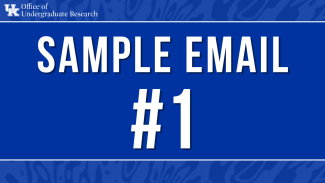
Correspondence Email Example #1
Dr. (or Professor)_______________,
My name is ______________ and I am a junior majoring in Biology with a minor in Health Advocacy. With exposure through the Lewis Honors College, I have become increasingly interested in undergraduate research, which is why I was so excited when you lectured Dr. Speck’s PGY206 class and presented your research lab. As an aspiring Physician’s Assistant with shadowing experience in Orthopedics, and as a former volleyball player with a personal interest in weight lifting and fitness, I believe that understanding the mechanisms of muscle hypertrophy would overall be very rewarding.
I would greatly appreciate an opportunity to discuss the possibility of my involvement in your research. I am more than willing to commit for the spring semester and summer session of 2018 at the least. Please let me know when you may be available. Thank you for your consideration, I look forward to hearing back from you.
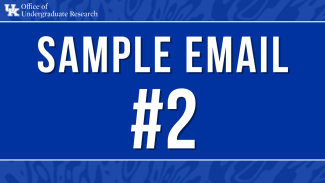
Correspondence Email Example #2
Dear Professor X:
My name is (your name), and I am very interested in becoming involved in research in Subject Area. I am a student at the University of Kentucky majoring in (major). I have:
Taken the following courses related to Subject Area...
Have had the following related experiences...
My goal is to...
I have reviewed your faculty research profile and am interested in the work that you have done. I was intrigued by your journal article "Article Title." (Provide reaction to article/area of research with specific references). I would like to get involved in research in this area because it will help me to better prepare for my long-term goals of…
Would it be possible to meet with you to further discuss (topic) and my possible involvement in research under your guidance? Here is my availability for the next two weeks (give several days and times that you’re available). I appreciate your consideration and look forward to hearing from you.
Respectfully,
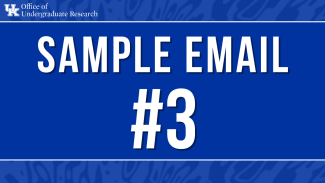
Correspondence Email Example #3
NOTE: Sample email from UCLA student but would equate to a 395 course at UK Dear Dr. Bruin,
I am a first-year UCLA undergraduate student majoring in Psychology. I wish to enroll in the Student Research Program (SRP) 99 Contract Course administered by the Undergraduate Research Center–Humanities, Arts, and Social Sciences. The program offers course units for research completed under the guidance of a UCLA faculty mentor.
I see by your faculty page that your research and teaching interests include stress in the workplace, and I recently read your article in Psychology Research entitled “Stress Analysis in the Workplace.”My research interests focus on the psychological impact of driving in Los Angeles, and I would like to explore how individual commutes could be a possible ‘upstream’ cause of workplace stress.
I would greatly appreciate an opportunity to meet with you to discuss the possibility of enrolling in an SRP 99 research course with you for the upcoming quarter. I am available on Tuesdays and Fridays after 2:00 p.m. for a meeting or interview. Please find my CV attached for your review.
I appreciate your time and consideration.
Student’s Name
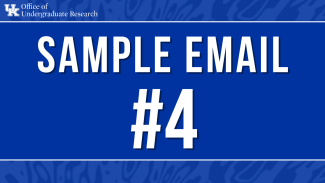
Correspondence Email Example #4
Dear Dr. (or Professor),
My name is __________________and I am currently a (year in school) here at the University of Kentucky majoring in (major) . Since coming to the University, I have become increasingly interested in getting involved in medical research. My ultimate goal is to become a pediatric doctor and I feel that participating in undergraduate research is a great way to gain further understanding of what being a doctor and working towards finding solutions to major medical issues is all about.
This semester I am a Chellgren Fellow, which has pushed me to get even more involved in research. As a Chellgren Fellow, we are prompted to get involved in research by finding a research mentor for the upcoming spring semester. I have attached a letter giving more details about the research aspect of the Fellowship from the professor in charge of the program.
I would love to meet with you to discuss the possibility of being involved in your research. Please let me know when you may be available. I truly look forward to hearing back from you.
- All Features
- Home Screen
- Smart Inbox
- Snooze Emails
- Reminder to Follow-up
- Email Signatures
- Newsletters & Notifications
- Help Center
- Email Templates
- Spark for Windows
- Spark 2 Website
How to Email a Professor: Tips and Samples
Dec 19th 2023

There are many situations when you need to email your professor: Asking a question, inquiring about your grades, or informing them about a missed class. If you’re wondering how to write an email to a professor, at the end of this article, you’ll find several email samples you can use for different occasions.
How to write an email to a professor: A step-by-step guide
1. Make sure you really need to send that email
If you want to email a professor asking a question, check your syllabus first. Chances are pretty solid you’ll find the answer. The syllabus can tell you about your workload, assignments, deadlines, and more. Your classmates are another valuable source of information, so make sure to talk to them first.
If the syllabus, or your peers, can’t answer your question, it’s fine to send an email with additional inquiries.
2. Use your school email
This is the best course of action because such an email looks professional and shows a recipient that your message is about classes. If you don’t have an educational email address, make sure to use an appropriate email address like [email protected] . Your [email protected] address isn’t suitable for academic correspondence.
3. Write a clear subject line
The subject line defines if a recipient opens your email, so make sure it’s clear, concise and to the point. A good subject line tells a professor what your email is about and how they should act on it.
4. Include a proper email greeting
Start your email to a professor with an appropriate and respectful salutation. Double-check their name before sending an email and make sure your greeting is followed by a comma.
5. Remind who you are
Professors have lots of students, so it’s important to tell them your name and the class you’re attending. This helps you save the recipient time and ensures you get a reply faster.
6. Get straight to the point
After greeting a professor and introducing yourself, it’s time to state your question or request. Keep it concise and clear, so the recipient can quickly comprehend what it’s about and what action is expected from them.
7. End an email politely and include a professional signature
How to end an email to a professor? Thank them for their time and sign off your email with “Sincerely” or “Best regards” followed by your name.
8. Proofread your email
Pay attention to grammar, spelling, and punctuation. Make sure to stick to a formal tone and avoid emojis or informal abbreviations like FYI or ASAP. Check the spelling of your professor’s name one more time.
9. Put yourself in your professor’s shoes
Reread the email as if you are a professor who receives it. Is it clear who’s writing to you and what they want? Is the tone of the email polite and respectful? Does it comply with a formal email format? If all your answers are “Yes,” then feel free to send your email.
Email to professor samples
Once you’ve learned how to email a professor, it’s time to practice. Below, you’ll find a number of email samples for different situations. Please keep in mind that these examples are for reference only, and you should always personalize and tweak them to your needs.
If you frequently need to email your professor, you can add these templates to Spark and reuse them whenever needed. Learn how templates in Spark work .
1. Email to a professor about not attending class
Subject: History 1B: Class attendance Dear Professor Smith, This is Lexie Brown, from History 1B, Section 1. I am writing to inform you that I won’t be able to attend your class on Thursday, as I have a doctor’s appointment at 11 AM. Please find attached my assignment we are supposed to submit by Thursday. I will also do my best to look through the materials you provided for this class and ask my classmates to share their notes. Thank you. Best regards, Lexie Brown
2. Email to a professor about grades
Subject: History 1B: Inquiring about my grade Dear Professor Smith, My name is Lexie Brown, from History 1B, Section 1. I was wondering if we could set up an appointment to discuss my grade on [Assignment name] . I have checked that your office hours are scheduled on Wednesdays from 2 to 5 PM. If this is correct, please let me know if I can come. I look forward to your reply. Kind regards, Lexie Brown
3. Email to a professor asking a question
Subject: Question about the History 1B assignment Dear Professor Smith, I am Lexie Brown, from History 1B, Section 1. In the syllabus, the deadline for our latest assignment is listed as April 9th. However, in class on Monday you mentioned April 12th as the deadline. Could you please verify the correct deadline? Thank you so much for your time. Sincerely, Lexie Brown
4. Email to a professor asking for an appointment
Subject: History 1B: Appointment request Dear Professor Smith, I am a student in your History 1B class, Section 1. I faced some difficulties with selecting a topic for my research paper, and I would appreciate it if I could discuss it with you during your office hours. Please let me know if you are available to meet this week. Thank you for your time. I look forward to your reply. Best regards, Lexie Brown
Want to become better at email? Get Spark . This free and powerful email client lets you use email templates, so you can save time with writing similar emails. It also gives you email superpowers like snoozes, email scheduling, and follow-up reminders to help you work with email faster.
Smart. Focused. Email.
- Priority Email
- Smart Notifications
- All How-Tos
- Add Mail Account to Mac
- Add Mail Account to iOS
- Delete Emails (Mac)
- Replace Emails (Mac)
- Delete Emails (iOS)
- Attach Emails (iOS)
- Replace Emails (iOS)
- Block Emails (iOS)
- Privacy Policy - Web
- Privacy Policy - App
- Terms of Service
- Cookie Policy
- Data Processing Agreement
- Responsible Disclosure
Apple, the Apple logos, MacBook, iPad, iPhone, Apple Watch, and Apple Vision Pro are trademarks of Apple Inc., registered in the U.S. and other countries. App Store and Mac App Store is a service mark of Apple Inc., registered in the U.S. and other countries.

Sample Email For Sending Documents To Professor
- January 9, 2023
- Academic Emails

You urgently need to send a document to your professor for them to review but you’re not sure what to include in the email. You could simply attach the file and forward it to them but you’re not certain that’s the right way to go about it.
We’ve got you covered as we’ve put together some templates you can simply modify and use for the purpose. Whether the documents in question are for your project or some form of evidence the professor requested, this article will provide some tips and samples you can use.
Use Proper Title
Use school email, formal tone, correct grammar, identify yourself, clear and brief, explain your situation, don’t forget attachment, wait patiently, clear subject line, end formally, school website, course syllabus, other students, template 1: project submission, template 2: assignment submission, template 3: send revised paper to professor for review, template 4: submit research proposal document to professor for review, template 5: sending resume for reference, template 6: ask professor for feedback on draft of research paper, template 7: ask professor for feedback on resume, tips for emailing professors.
Professors are used to communicating with students like yourself daily. So, whatever your reasons are for sending those documents, you shouldn’t fear. Just make sure you keep these things in mind when contacting them.
You might think this shouldn’t be a problem but using the right title can help make a good impression. Professors put in a lot of work to receive their titles.
You should respect that by addressing them properly. If you aren’t sure whether they’re professors yet, you can contact your colleagues, check their course syllabus, or the school website to confirm their official titles.
Examples: Dear Professor {{ Last name }} Dear Dr. {{ Last name }}
Your school most likely provided you with an email address. This can be used for any communication between yourself, the faculty, and your peers.
Your professors also have their official school email addresses. It’s advisable to reach out to them through their school-issued emails.
Keep in mind that internal emails wouldn’t be blocked by spam filters. So, you can be assured that the professor would successfully receive the email.
Also, using the school email ensures that the conversation would be available to authorities should the conversation be needed for any investigation in the future.
You’re writing to the professor at their formal station. Ensure that you use a formal tone when communicating with them.
Irrespective of your relationship with the professor, it’s advisable to refrain from informal language. That means no emojis and slang in your email.
Keep in mind that administrators would have access to this email and any sign of over-friendliness between a professor and student could raise alarms.
So simply refrain from using informal language in your emails to your professor unless it’s needed due to the context of the email.
The last thing any professor wants to see is a college student with horrible grammar. Professors expect students at the tertiary level to be good at writing simple emails.
It’s advisable to review your email to ensure that any mistakes are identified and corrected. Tools like Grammarly are also useful as they can help you identify some of these errors.
Keep in mind that these tools aren’t perfect, so relying solely on them would be disadvantageous.
No one in a position of authority likes to receive an email from someone who feels entitled. It doesn’t matter whether you like or dislike the professor, your tone should be polite.
Professors have a lot of work on their plate and the last thing they want to do is spend their precious time reading through an email from a rude student. They’d most likely skip the rest of your email if your tone isn’t polite.
You may be close to the professor but that doesn’t mean they may easily remember you. No professor wants to spend the next hour of their life looking through their student list to determine who you are.
If you don’t identify yourself in the first paragraph, you should at least include your full name, class, and section number (if available) when you’re signing off.
Your professor doesn’t have the time to read through a long email. They receive multiple emails daily from students, their peers, other academic platforms/journals, and more.
They don’t have the time to read through long emails from students.
So, you should keep your email short and to the point. Include relevant information only while also maintaining a polite tone.
If you need the professor to take a specific action, you should explain it politely in your email in as few words as possible.
In cases where you’ve already discussed this with the professor, you should remind them of the conversation in a single sentence. You don’t need to remind them of the moment you met and every single word you both said.
Simply include a single sentence that would point them in the right direction if needed.
Can’t remember the number of times I’ve written an email to someone asking them to find the file they needed, attached only to receive a reply that the attachment was missing.
Unfortunately, this is quite common especially when you’re having a stressful day. It’s an easy mistake to make but can be costly when your email is time sensitive.
To avoid making this mistake, verify that the file has been successfully attached and that’s the right file. Trust me, it could save you a lot of headache.
Don’t bombard your professor with multiple emails. You’re better off visiting their office to inform them if they’ve not responded to your email after some time.
Pestering them isn’t going to yield any positive results. You can also send them a reminder if you do not hear from them after 2 or 3 days. After this, it’s advisable to visit their office to bring this to their attention.
Don’t feel bad if they say they haven’t been able to read your email yet. Keep in mind that professors have very busy schedules. Yours may just have gotten mixed in with the numerous emails they may have received.
If the document is time sensitive, it’s advisable to send it to the professor as early as possible. Don’t wait till the deadline is almost up to send it to the professor, expecting them to act in time to meet the deadline.
It’s a sign of disrespect for their time and also shows them that you aren’t serious. So, don’t wait till the last minute to send the document to your professor. You can’t blame them if you miss your deadline.
It’s advisable to never send your professor an email without a subject line. They may simply skip it to more pressing emails. Remember they receive multiple emails daily.
An example of a subject line can be something like this:
Example: Project Submission – {{ Project name }}
Thank them for taking the time to read your email and sign off. If you didn’t include your full name, class, and section numbers in the first paragraph, you can include them when signing off.
{{ Your full name }}
{{ Class and Section }}
How To Find Your Professor’s Email
If you aren’t sure of your professor’s email, there’re ways you can find out.
Check your school website’s faculty page. You’ll find your professor’s details including their official email address. Alternatively, you can check your school’s learning management system.
The professor’s contact details will be included on the overview pages of their courses. You can send them a message directly from the school’s learning management system.
If you have the professor’s course syllabus, you can check it out to find their official contact information. They usually include their contact details and individual attendance policies on the course syllabus.
Chances are, you’re not the only student who has had to email the professor. You can ask your peers for the professor’s email. Even if none of your peers has sent them an email, you can be sure that someone has seen it somewhere.
Sample Email For Sending Document To Professor
Email Subject Project Submission – {{ Project name }}
Email Subject Assignment Submission – {{ Project name }}
Email Subject Revised Paper For Review
Email Subject Research Proposal For Review
Email Subject Request For Reference
Email Subject Feedback On Draft Of Research Paper
Email Subject Request To Review Resume
Hi there and welcome to UnitWriter. My name's Chris, an expert in crafting effective email templates for all occasions. I created this blog to share my knowledge, by offering tips and templates to help get you started on your emails. Hope it's been helpful
Related Posts

Lecture Cancelled Email (Samples)
- March 28, 2023

How To Email Professor During Holiday
- February 27, 2023

How To Write Email To Professor For Project Submission (Samples)
- February 20, 2023
Leave a Reply Cancel Reply
Your email address will not be published. Required fields are marked *
Name *
Email *
Add Comment *
Save my name, email, and website in this browser for the next time I comment.
Post Comment
How to Email a Professor for the Supervision in MS/PhD
by Scholarships Corner | Jun 9, 2020
Are you planning to study abroad and looking forward to writing an email to the professor but uncertain about the criteria? In this article, you will learn “How to Email a Professor for MS or PhD supervision” and you must know proper email is the basis for research supervision, scholarships/ research scholarships , and fundings.
Proper email is the key here. You must know that through the proper email you can fully fund scholarships ( Masters Scholarships or PhD Scholarships ) for your studies. Many people ignore all these points that’s why they don’t get any response from the professors. Carefully read the whole article and learn more about how to write an email to a professor, or how to write an email to a professor for a research assistantship, how to write an email to a professor for graduate school admission, how to write an email to a professor for research, how to write an email to professor for masters or how to write an email to professor for PhD.
Your email should be outstanding, gives a nice impression, and assists you to be a well-qualified applicant. The applicant should be acknowledged regarding email patterns, keywords, and structure.
Your email should be out loud that shows why you are interested in the selected field, how you can be a perfect person for this position. Repetition of the words should be avoided, the matter should be clear, correct, and concise.
Whenever you are approaching a professor, try to give a read to his research material and mention it in your email. Keep a check on the correct use of punctuation and grammar in the email.
How to Email a Professor for the Supervision in MS/PhD?
How to address the professor.
Ignoring an email by a professor is quite normal as they have busy schedules, so be attentive while writing the subject line. In order to make sure that your email will not be ignored, try to include an information-based, strong, and attractive subject line. By the correct use of words in the subject line professor will be able to catch an idea of what your email is about. You can write like that, “Request for MS Supervision Spring 2020 or Spring 2021” or “Request for PhD Supervision”
Always begin or address the person by using professional greetings for instance with Dear Prof._____, Dear Dr.____, and avoid addressing with Mr.____, Ms.____ or Mrs.____
Introduction:
The 1st paragraph should give a concise summary of your self including your native country and your name. It must tell you about your achievements, experience, and qualifications relevant to the open position. By addressing the professor’s research area, you can also show that you also want to work on one of his research projects in his lab. Moreover, you can give a clue that you are eager to get any possible PhD/MS opportunities or scholarships in his custom research or lab group.
Body Paragraph:
In this paragraph, with the consideration of the professor’s research area, mention your work experience, skills, and previous research work. The applicant can get a brief overview of the professor’s research publications, previous, and current projects by visiting the lab’s official website. In order to be a good competitor, you must list all of your achievements and expertise to provide a clear vision about your passion in the professor’s research area. Avoid any jargon or slang words, and any kind of complexity.
Last Paragraph:
The last paragraph is supposed to be the last one. In this paragraph, you have to show your enthusiasm, passion, and motivation to work in the professor’s research group. Furthermore, you can state what inspires you to be a part of this research group or a specific domain.
Closing Statement:
With a polite, requesting, and respectful manner close this paragraph and write a short statement regarding the CV or any other document attached and ask if any document is required. For example, Kindly find the attached document, and would love to provide you with further documents if needed. If the process will be manageable, I would look forward to being a part of your research ( project name) in the coming fall.
Proof Reading:
Make sure that you review your email before forwarding it to the professor, it will help you to convey your message in the nicest way.
Sample Email for requesting to the Professor for Supervision in MS/PhD
Subject: Request for MS or PhD Supervision or Request for MS or PhD Research Assistantship
Dear Professor______,
My name is (write your name) and I have completed (your degree title) from (Full university name) with (your CGPA, don’t mention CGPA if it’s low). Mention I got medals, certificates, and achievements if any.
(Write about Projects, internships, research, or thesis) During my undergraduate or Masters’s studies, I have been engaged in a research project or have written any thesis ( relevant to my expertise), include that. Moreover, I have done internships, research publications, current or previous work experience, or online courses.
I have visited your research articles and found my field of interest in your research area. I am very enthusiastic to conduct and pursue your research along with him. (Do mention the name of the Research Lab Name or website, Also mention the research topic or fields in which you are interested)
I have attached my CV /other required documents and I would be glad to hearing from you soon.
I am very thankful and looking forward to your positive response.
Best Regards,
Note: For Fully-Funded national and international opportunities, visit our Facebook Page , Twitter , Instagram , LinkedIn , Pinterest , YouTube Channel , and Telegram .
Scholarships Corner is a diverse forum where people aspiring to pursue higher studies or polishing their educational and professional skills.
Join our WhatsApp Channel

Latest Opportunities

Leadership & Conflict Resolution Certification in Cambridge, UK by GPC

Google Creative Fellowship 2024 in the USA | Paid Fellowship

Inje University GKS Scholarship 2024 in South Korea | Fully Funded

Bucharest Summer University 2024 in Romania | BSU 2024

AACR Research Fellowships in USA 2024 | Fully Funded

Generation Google Scholarship 2024-2025 | Google Scholarships
Join our telegram channel.

Stay Connected With Us

Subscribe To Our Newsletter
Join our mailing list to receive the latest scholarships news and updates from our team.
You have Successfully Subscribed!

- Templates & How-tos
- Find Your Way Newsletter
- Peer Success Leaders
- Duke Faculty Journeys
- Book an Appointment
- Submission Guidelines
- Programs & Events

Follow-Up and Reminder Emails
Follow-up and reminder emails to professors can seem intimidating to write ; you need an answer to a question or request , but you don’t want to seem pushy or demanding. Well , just like you rs , professor s ’ inb oxes are full of email ; sometimes your message might slip through the crack s , or the professor read it and meant to reply , but something urgent came up –so gentle reminders are perfectly acceptable and even helpful. As a general rule of thumb , wait at least 48 hours to send a follow-up to a professor, and if you email on a Friday afternoon or weekend , wait until at least Tuesday afternoon before reaching out again .
Subject: Follow-up about [Reason for Follow -up]
Good afternoon Professor* [Last name],
I hope all is well. I wanted to follow up on my email from [when you sent it] about [what your concern or question is] . I understand you have a busy schedule, but I wanted to see about [whatever you are following up on].
I greatly appreciate your time. Thank you again in advance for your help with [question]. I look forward to hearing from you soon!
Sincerely,
[Your name]
Subject: Reminder about [Reason for Reminder]
Good morning Professor* [Last name],
I hope all is well. I know you have lots of things going on, but I just wanted to remind you that [whatever you are reminding of] is due/needed by [date]. Thank you again for taking time to complete [request]. Please let me know if you have any questions or need additional information.
Thank you again!
Sincerely,
*Use the title they use for themselves. If they haven’t specified, “Professor [Last Name]” is preferred.
Powered by WordPress & Theme by Anders Norén
Written Samples
- 10 Sample Emails to Professors for Master’s Admission
Email communication has become an integral part of the modern academic world, especially when it comes to pursuing higher education.
Whether you’re seeking admission to a master’s program, looking for guidance on your research interests, or expressing your gratitude for a scholarship award, crafting well-structured and professional emails to professors is key to making a positive impression.
In the competitive landscape of master’s program admissions, the way you communicate with professors can greatly influence your chances of success. Your emails should not only convey your genuine interest but also reflect your professionalism and readiness for graduate studies.
To assist you in this endeavor, we’ve compiled a comprehensive guide with 20 sample emails, each designed for specific stages of the application process.
Sample Emails to Professors for Master’s Admission
Below are some sample emails that cover a wide range of scenarios, from initial inquiries about program details to follow-ups after interviews, expressing gratitude for scholarship awards, and more.
Each email is thoughtfully crafted and follows best practices for effective communication in academia.
1. Initial Inquiry Email
Subject: Inquiry About Master’s Program Admission
Dear Professor [Professor’s Last Name],
I hope this email finds you well. My name is [Your Name], and I am writing to express my strong interest in the [University Name] Master’s Program in [Program Name] for the upcoming academic year. I have read about your impressive research in the field of [Specific Research Area], and I am excited about the prospect of studying under your guidance.
In my pursuit of higher education, I have developed a keen interest in [Related Field] and believe that the resources and expertise offered at [University Name] align perfectly with my academic and career goals. I would appreciate it if you could provide me with more information about the admission requirements, application deadlines, and any specific prerequisites for your program.
I have attached my resume and transcripts for your reference. I am eager to learn more about the program and how I can contribute to the academic community at [University Name]. Thank you for considering my inquiry.
[Your Full Name] [Your Title] [Your Organization] [Contact Information]
2. Formal Application Email
Subject: Application for Master’s Program in [Program Name]
I hope this email finds you in good health. I am writing to formally apply for admission to the Master’s Program in [Program Name] at [University Name], beginning in the [Academic Year].
Having carefully reviewed the program’s curriculum and faculty profiles, I am particularly excited about the opportunity to work with you on research related to [Specific Research Area]. Your work in this field, as evidenced by [mention specific publications or projects], aligns perfectly with my academic and career aspirations.
I have submitted my online application, along with all required documents, including transcripts, letters of recommendation, and my statement of purpose. I have also ensured that my recommenders have submitted their letters directly.
I look forward to the possibility of joining the [University Name] community and contributing to the ongoing research efforts in [Specific Research Area]. If you require any additional information or documents, please do not hesitate to let me know.
Thank you for considering my application.
Warm regards,
3. Follow-Up Email After Application Submission
Subject: Follow-up on Application Status for Master’s Program
I hope this email finds you well. I wanted to follow up on my application for the Master’s Program in [Program Name] at [University Name], which I submitted on [Date of Submission]. I am eagerly awaiting news regarding the status of my application.
I remain deeply interested in the program, and I am enthusiastic about the opportunity to contribute to research in [Specific Research Area] under your guidance. I understand that the admissions process is highly competitive, and I appreciate the time and effort that the admissions committee invests in reviewing applications.
Is there any additional information or documentation you may require from my end? Please feel free to reach out if there are any updates or if you need further clarification regarding my application.
Thank you for your attention to my application. I look forward to your response.
Best regards,
4. Expressing Gratitude for Acceptance
Subject: Gratitude for Acceptance to Master’s Program
I hope this email finds you in good spirits. I am writing to express my heartfelt gratitude for offering me the opportunity to join the Master’s Program in [Program Name] at [University Name]. I am thrilled to accept your generous offer of admission.
Your research in [Specific Research Area] has been a significant source of inspiration for me, and I am excited about the prospect of working closely with you and contributing to the ongoing research efforts within the department.
I understand that the next steps involve the registration process, course selection, and orientation. I would greatly appreciate it if you could provide me with guidance on these matters and inform me of any important deadlines.
Once again, thank you for this incredible opportunity. I look forward to beginning this new chapter of my academic journey at [University Name].
5. Request for Meeting Before Enrollment
Subject: Request for a Meeting to Discuss Program Details
I hope you are doing well. As the start of the Master’s Program in [Program Name] at [University Name] approaches, I am eager to connect with you and discuss some important aspects of the program.
I believe that a face-to-face meeting or a virtual discussion would be immensely beneficial in terms of clarifying any queries I may have about course selections, research opportunities, and any specific requirements or expectations within the program.
Could we arrange a convenient time for a meeting or a virtual call in the coming weeks? I value your insights and guidance and want to ensure a smooth transition into the program.
Thank you for considering my request, and I look forward to hearing from you soon.
6. Email to Inquire About Program Details
Subject: Inquiry Regarding Master’s Program in [Program Name]
I trust this email finds you well. I am writing to inquire about the Master’s Program in [Program Name] at [University Name]. I am extremely interested in pursuing my master’s degree at your esteemed institution and have a few questions regarding the program.
Firstly, could you provide me with information about the program’s core curriculum and any elective courses available? Additionally, I would like to learn more about opportunities for research assistantships or internships within the department.
Furthermore, if you could guide me on the application process and any upcoming information sessions or open houses, I would greatly appreciate it. I am looking forward to applying and want to ensure that I am well-prepared.
Thank you for your time and assistance. I look forward to hearing from you soon.
7. Follow-Up Email After Interview
Subject: Follow-Up After Interview for Master’s Program Admission
I hope this message finds you in good health. I wanted to express my gratitude for the opportunity to interview for admission to the Master’s Program in [Program Name] at [University Name]. It was a pleasure discussing my academic and research interests with you.
I am eager to know if there are any updates regarding the status of my application or if there are additional steps I need to follow. I remain enthusiastic about the program and look forward to the possibility of joining your department.
Thank you once again for your time and consideration.
8. Expressing Continued Interest
Subject: Reaffirming My Interest in the Master’s Program
I hope this message finds you well. It has been a few weeks since I submitted my application for the Master’s Program in [Program Name] at [University Name]. I wanted to take a moment to reaffirm my strong interest in the program.
Your research in [Specific Research Area] continues to inspire me, and I am excited about the opportunity to contribute to the field under your mentorship. If there are any updates regarding my application or if you require any additional information, please do not hesitate to let me know.
I appreciate your consideration and look forward to the possibility of becoming a part of the [University Name] community.
9. Request for Scholarship Information
Subject: Inquiry Regarding Scholarships for Master’s Program
I trust you are doing well. I am in the process of finalizing my plans for graduate studies and wanted to inquire about any scholarship opportunities available for the Master’s Program in [Program Name] at [University Name].
I am highly interested in the program due to its strong alignment with my academic and career goals. However, as I consider various factors, financial support is a significant consideration for me. Could you please provide information on scholarships, assistantships, or any financial aid options that might be available to incoming students?
I appreciate your assistance in this matter and look forward to your response.
10. Expressing Gratitude for Scholarship Award
Subject: Gratitude for Scholarship Award for Master’s Program
I hope this email finds you well. I wanted to extend my heartfelt gratitude for awarding me the [Scholarship Name] for the Master’s Program in [Program Name] at [University Name]. I am both honored and thrilled to have received this scholarship.
Your support significantly alleviates my financial concerns and allows me to fully focus on my academic pursuits. I am excited about the opportunity to contribute to the [University Name] community and excel in my studies under your guidance.
If there are any further steps I need to take regarding the scholarship or any specific requirements, please let me know. Once again, thank you for your generosity.
Tips for Writing Effective Emails to Professors for Master’s Admission
- Be Concise: Keep your emails clear and to the point. Professors receive many emails, so brevity is appreciated.
- Research the Professor: Mention specific aspects of the professor’s work that align with your interests to show genuine interest.
- Proofread: Ensure your emails are free of spelling and grammar errors to convey professionalism.
- Use a Professional Tone: Address professors respectfully and professionally, using proper salutations and sign-offs.
- Attach Necessary Documents: Include attachments such as transcripts, resumes, and recommendation letters as required.
- Follow Up Politely: If necessary, follow up on your application, but do so politely and without being pushy.
- Express Gratitude: Show appreciation when you receive an offer of admission.
- Request Meetings Thoughtfully: If you request a meeting, do so respectfully and with a clear purpose in mind.
The sample emails above should help you navigate various aspects of the master’s admission process effectively. Remember to tailor your emails to your specific circumstances and maintain a professional and respectful tone throughout your communication with professors and university staff. Good luck with your master’s program applications!
- 20 Sample Email Replies to Refund Request
- 20 Sample Email Responses to Employee Complaints
- 25 Sample Email Replies to Meeting Invitation
- 25 Business Email Auto-Reply Samples
- 20 Sample Emails to Confirm Interview Schedule
- 25 Sample Email Replies to Leave Rejection
- 15 Sample Email Replies to Customer Asking for Discount
- 25 Sample Email Replies to Second Interview Invitation
- 25 “Duly Noted” Email Reply Samples
- 25 Sample Email Replies to College Coach
- 20 Sample Email Replies to Customer Inquiry
- 25 Sample Email Replies to Declined Job Offer
- 15 Sample Email Replies to Job Rejection
- 15 “No Longer with Company” Email Reply Samples
- 35 Sample Polite Replies to a Rude Email
- 20 Sample Emails Asking Co-workers to Contribute to a Gift
- 25 Status Update Reply Email Samples
- 25 Sample Email Replies to Patient Complaint
- 20 ‘Out of Office’ Auto Reply Email Samples
- 20 Sample Email Replies to Applicant for Interview
- 20 Sample Email Replies for Hotel Reservation
- 10 Sample “Thank You” Email Replies to Interview Invitation
- 25 “Do Not reply to This Email” Samples
- 25 Sample Email Replies to Promotion Email
- 20 Sample Email Replies for Reference Check
- 25 Sample Email Replies to Negative Feedback
- 25 Sample Email Replies on Behalf of Boss
- 20 Sample Replies to Appreciation Email from Boss
- 20 Sample Replies to Escalation Email
- 25 Sample Email Responses to Apartment Listing
- 12 Sample Emails to Reschedule a Meeting
- “20 Sample ‘Thank You’ Replies to Introduction Email”
- 25 Audit Response Email Samples
- 10 Sample Emails to Invite a Guest Speaker
- 20 Offer Letter Acceptance Email Reply Samples
- 24 Sample Email Replies to “Your Price is Too High”
- Community and Engagement
- Honors and Awards
- Give Now
Assistant Professor of Learning, Design, and Technology Ela Castellanos-Reyes Wins May Kay Sommers Dissertation Award from Purdue University

Ela Castellanos-Reyes , an assistant professor of learning, design, and technology in the NC State College of Education, has received the Mary Kay Sommers Dissertation Award from Purdue University, where she earned her doctoral degree.
The Dissertation Award recognizes an outstanding dissertation from a recent graduate based on its contributions to the field of education, quality and strength of the dissertation, and quality of writing demonstrated.
“Receiving this award means the world to me. It is evidence of God’s support throughout my academic journey by opening doors considered unachievable for migrant women like me and giving me the courage to pursue complex methodologies,” Castellanos-Reyes said. “My dissertation work is a small step in the field of distance learning but a huge milestone for me!”
Entitled “Evolution of Social Presence: Longitudinal Network Analyses of Online Learning Peer Interactions From a Social Learning Analytics Perspective,” the award-winning study examines how online students’ social presence evolves over time to shape their online learning behaviors. Castellanos-Reyes’ dissertation was supported by the National Academy of Education Dissertation Fellowship and the Bilsland Dissertation Fellowship .
The study consists of three articles, the first of which explores social presence through clickstream interaction, or the number of replies received and sent in an online discussion, and found that dropout rates could be lowered if social presence affordances are used purposefully and that adding social media characteristics to discussion boards inhibits conversational behavior.
The second study used peer-nomination data and a scale to investigate the spread of social presence perceptions in online networks of students over three consecutive courses. Although there was no evidence of social influence, the study found that online learners who nominated more peers were more likely to report higher social presence perceptions over time and that students were not more likely to share with those who showed similar levels of social presence.
The final study is a conceptual framework that integrates network theory and the online learning literature into a new perspective to analyze learners’ online behaviors and interactions under the light of social presence theory.
“The findings of this dissertation improve educational practice by identifying behaviors that harm online social presence and providing specific actions for online instructors and instructional designers to promote social presence in online learning,” Castellanos-Reyes said.
- Research and Impact
- Ela Castellanos-Reyes
- faculty publications
- honors and awards
- Publications
More From College of Education News
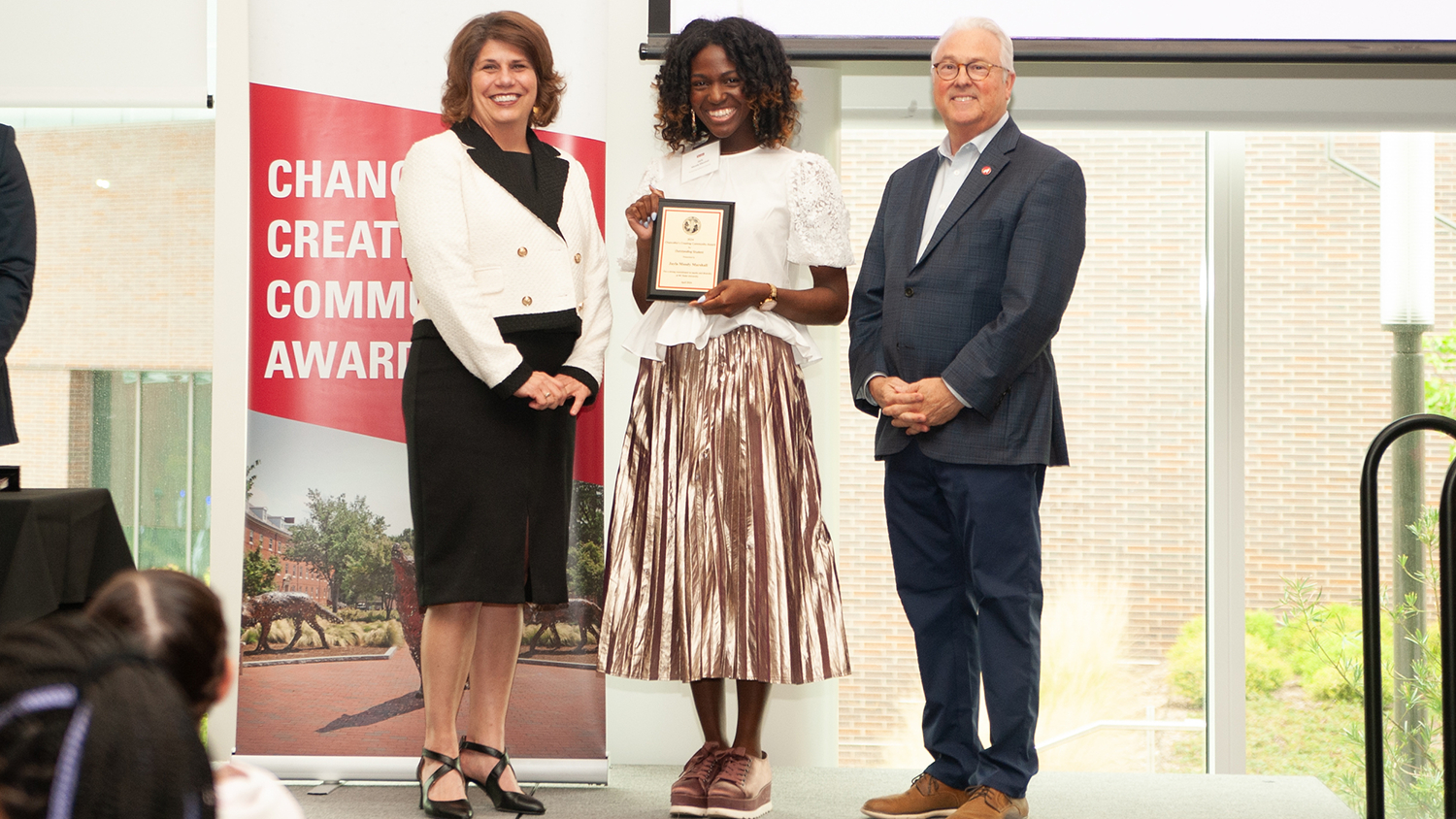
Doctoral Student Jayla Moody Marshall Wins Chancellor’s Creating Community Outstanding Student Award

RTNN Wins 2024 Opal Mann Green Engagement and Scholarship Award

Goodnight Distinguished Professor in Educational Equity Maria Coady Receives Leadership Through Research Award from AERA Second Language Research SIG

IMAGES
VIDEO
COMMENTS
In the following sample email, the student informs the supervisor that he cannot meet the agreed deadline. Dear Professor Nguyen, during our last meeting we agreed that I would send you a full draft of Chapter 3 by Friday, the 3rd of August. Unfortunately, I won't be able to meet the deadline.
1. How to write an excuse email to professor example. Dear Professor (name), My name is (your name), and I'm in your (insert details) class. First, I would like to apologize personally and explain why I have been unable to (insert what you need an excuse for). II would like to reassure you that this won't happen again.
Addressing your supervisor. In your first email contact with your dissertation supervisor, it is wise to address him or her quite formally (such as "Dear Dr. X" or "Dear Prof. Y"). You do not know what your supervisor will be comfortable with, so it is best to play it safe. If your initial contact is too informal, your supervisor may ...
8. Use a formal tone. Address the professor by their title and surname. When you introduce yourself, avoid openers and slang like "Hi," "Hey," or "What's up.". Stay away from emojis and abbreviations. Keep things professional and chose a formal goodbye as well, like, "Sincerely," "Best," and "Thank you for your time.".
Even better, attach a note from your coach, employer or doctor who can attest to why you need an extension. Subject: Extension on _____. Dear Professor _____, I hope all is well. I have been extremely busy and stressed with assignments in other classes and with _____ (sports practice, on-campus job, other commitment, health condition, etc.).
Making an appointment. Dear Dr. Janssen, The college has informed me that you will be my supervisor. I would therefore like to make an initial appointment to discuss my dissertation idea with you. I look forward to hearing from you as to when you would be available to meet with me. Sincerely,
And, as normally comes after someone's title, you should be sure to include their last name after. So, let's say you're emailing a professor called Susan Robinson. You could start the email off with something like: "Dear Dr. Robinson," or "Hello Dr. Robinson," or "Dear Professor Robinson," or "Hello Professor Robinson,".
Extension Email to Professor Example. Subject line: Extension for [Assignment Name] Dear Professor [Last Name], My name is [your name], and I'm a student in your class [class name]. I'm writing to request an extension for our assignment about [assignment details]. I've been struggling to complete the assignment in time because of [reasons].
Be very aware of the email address you use to email a professor, and carefully consider what it might be communicating. 3. Check the syllabus before you start emailing. Most of the professors noted that students often already have the information they're seeking before they send an email. Dr.
Here is an example of an ineffective email from a student: Below is one approach to revising the ineffective email: SUBJECT: Be sure to utilize the "subject" field in an email. This immediately orients your professor regarding the email's content. It can be especially helpful to include the name of the course and the section number.
Ensure that the mail is focused on the topic of research. Be polite and respectful. Keep the e-mail short, simple and specific. Take care of the time zone the professor is in (if necessary). Try sending the mail during office hours to avoid the risk of the mail going unnoticed.
How does one write an email application for a master's thesis or dissertation? Detailed Question -. A master's student is required to pursue their dissertation/thesis under a professor at any institution in the same country or abroad. For this, what are the various points one should keep in mind while writing the cover letter/e-mail application?
Your email should: have an informative subject line. be concise. be formal: Dear Dr. Smith; Sincerely, Your Name. not use Mrs. or Ms. NOT have slang, abbreviations, or emoticons. if applying for an opening: address any qualifications the professor is looking for. demonstrate your experience.
How to send email to thesis supervisor. Flowrite is an AI email writer that turns short instructions into ready-to-send emails and messages across your browser. Our smart template uses artificial intelligence to adapt to the situation and generate unique emails and messages, taking into account the recipient and previous message: Try it yourself.
Submitting Your Thesis/Dissertation. Submission of the final thesis/dissertation must be within 60 days of the final exam. Students who miss the 60 day submission deadline are ineligible to register in future terms. The Graduate School uses ProQuest to administer the electronic thesis/dissertation (ETD) submission and committee approval process ...
Correspondence Email Example #4. Dear Dr. (or Professor), My name is __________________and I am currently a (year in school) here at the University of Kentucky majoring in (major) . Since coming to the University, I have become increasingly interested in getting involved in medical research. My ultimate goal is to become a pediatric doctor and ...
The subject line will help the professor to guess. about the contents of your email even before opening it. We recommend you to always use a. clear and catchy subject line. For example, "Request ...
A good subject line tells a professor what your email is about and how they should act on it. 4. Include a proper email greeting. Start your email to a professor with an appropriate and respectful salutation. Double-check their name before sending an email and make sure your greeting is followed by a comma. 5.
Avoid writing long emails if you want them to read through it all. Professors receive multiple emails from students, other staff members, publications, and more. Don't make things difficult for them by writing lengthy emails. Shorten the email as much as possible while also maintaining a polite tone.
Template 1: Project Submission. Template 2: Assignment Submission. Template 3: Send Revised Paper To Professor For Review. Template 4: Submit Research Proposal Document To Professor For Review. Template 5: Sending Resume For Reference. Template 6: Ask Professor For Feedback On Draft Of Research Paper.
By the correct use of words in the subject line professor will be able to catch an idea of what your email is about. You can write like that, "Request for MS Supervision Spring 2020 or Spring 2021" or "Request for PhD Supervision". Always begin or address the person by using professional greetings for instance with Dear Prof._____,
Good afternoon Professor* [Last name], I hope all is well. I wanted to follow up on my email from [when you sent it] about [what your concern or question is]. I understand you have a busy schedule, but I wanted to see about [whatever you are following up on]. I greatly appreciate your time. Thank you again in advance for your help with [question].
1. Initial Inquiry Email. Subject: Inquiry About Master's Program Admission. Dear Professor [Professor's Last Name], I hope this email finds you well. My name is [Your Name], and I am writing to express my strong interest in the [University Name] Master's Program in [Program Name] for the upcoming academic year.
When Jayla Moody Marshall — a student in the Ph.D. in Educational Leadership, Policy, and Human Development higher education opportunity, equity, and justice concentration — chose the NC State College of Education for her doctoral degree, she knew the program would help her achieve her goal of designing higher education environments where everyone knows they belong and matter.
Ela Castellanos-Reyes, an assistant professor of learning, design, and technology in the NC State College of Education, has received the Mary Kay Sommers Dissertation Award from Purdue University, where she earned her doctoral degree.. The Dissertation Award recognizes an outstanding dissertation from a recent graduate based on its contributions to the field of education, quality and strength ...